
| 6
AFMDA GALA
Second Annual Hope Gala aids Magen David Adom and the people of Israel
MAKING MEMORIES
Tucson residents share some of their favorite camp memories



| 6
Second Annual Hope Gala aids Magen David Adom and the people of Israel
Tucson residents share some of their favorite camp memories

SHANNON LEVITT | STAFF WRITER
The Center for Holocaust Education at the East Valley Jewish Community Center (EVJCC) is hosting its annual Yom Hashoah commemoration on Wednesday, April 23. The “evening of remembrance and reflection” is open to everyone across the Valley. Local Holocaust survivor Charlotte Adelman is the evening’s featured speaker. Born in Paris in 1932, Adelman spent years of her childhood, between the ages of 10 and 14, hiding from the Nazis. In February, she published a memoir, “Charlotte: A Holocaust Story of Strength, Courage and Hope,” co-written with Mala Blomquist, managing editor of Jewish News.
At the EVJCC, Adelman will share many of her childhood memories, including some of the harrowing stories of hiding and being moved from place to place with different families, her reunion with her father, who was part of the French resistance, and finding her brother after the war. Sadly, her mother, with whom she was very close, was murdered in the Holocaust.
Her memoir also recounts her experience of a terrible early marriage in France, her move to Canada, learning English, finding work, and eventually love, in the United States. In 2018, she returned to France to meet with one of the family members who helped her hide from the Nazis. The evening will also include a candle-lighting ceremony, a short prayer service led by EVJCC CEO Rabbi Michael Beyo and a musical performance by pianist Hannah Creviston titled “Voices Silenced: Music from the Holocaust.” Creviston, a clinical associate professor at Arizona State University, will perform a piece by composer James Simon, who was killed during the Holocaust.
SEE JCC PAGE 2
The day that Stacy Rosenthal first took on a small volunteer role with the Association of Reform Jewish Educators (ARJE) several years ago, then-Congregation Beth Israel (CBI) Rabbi Rony Keller told her she would one day lead the organization she had joined as a CBI teacher.
“I told her, ‘That’s it! You’re hooked! I promise you one day you’ll be president,” Keller recounted to Jewish News. She would protest, arguing that she would never have the right credentials to hold such a position. It became an ongoing joke between them.
Turns out, Keller knew what he was talking about.
More than 16 years after joining ARJE, Rosenthal officially became its president the first weekend of March. She made clear that she will focus on including diverse voices and experiences, and ensuring that ARJE is a place where every member feels welcome.
Keller was on hand to give the blessing for her installation.
Perhaps it was predictable that Rosenthal, someone who gravitates toward leadership roles, would one day take charge of the national organization she loves. After all, she’s always found herself on “a natural pathway” to leadership even when she hasn’t sought it out specifically. It usually starts the moment someone asks her to join a committee or a board. Sooner or later, she’s in charge of it.
SEE LEADER, PAGE 3


New Passover children’s books include a mystery, Obama’s White House seder and a graphic novel from writer Dara Horn. See page 22. PHOTO COURTESY OF CROWN BOOKS; INTERGALACTIC AFIKOMEN; CRESTON BOOKS; NORTON BOOKS



This is Adelman’s first appearance at the EVJCC. However, Creviston has performed songs from composers who were killed in the Holocaust on other occasions. She likes to present music from different composers each time she performs at the EVJCC, and shares information about the composers before performing their work. As a collaborative pianist, she regularly performs in festivals and competitions throughout the United States and abroad.
In past years, she has performed with a violinist and a flutist; vocalist Amanda DeMaris; and saxophonist Christopher Creviston, who is also her husband.
January
Performing music from Jewish composers who were killed in the Holocaust has been a project Creviston has been working on for years. She was inspired by a talk Eva Schloss gave at the Chandler Center for the Arts in 2019.
January
January
February
February
January 20

said Jon Meyers, director of ADDPC.
said Jon Meyers, director of ADDPC.
“Our hope is to create and promote opportunities for people to be embraced, become part of the community and find equitable opportunities wherever they
“Our hope is to create and promote opportunities for people to be embraced, become part of the community and find equitable opportunities wherever they
Meyers first came to know Stern through her mother, Amy Silverman, who read her personal essays about raising a daughter with Down syndrome on KJZZ, National Public Radio’s Phoenix affiliate station.
Meyers first came to know Stern through her mother, Amy Silverman, who read her personal essays about raising a daughter with Down syndrome on KJZZ, National Public Radio’s Phoenix affiliate
about her Judaism with her fellow council members and speaking out for her rights

Meyers was so captivated by the essays that he reached out to Silverman, and the
She already has some practice at
about her Judaism with her fellow council members and speaking out for her rights
She already has some practice at
“One time, I was in class and someone called me the R-word and I told him not to. The teacher was in the hallway and another student repeated the word,” she said. Rather than letting the situation go, she told her theater teacher, who was able
“One time, I was in class and someone called me the R-word and I told him not to. The teacher was in the hallway and another student repeated the word,” she said. Rather than letting the situation go, she told her theater teacher, who was able to intervene.
“If someone has a disability, saying the R-word is like saying the F-word,” Stern said.
“If someone has a disability, saying the R-word is like saying the F-word,”
While performing in the musical “Hairspray,” she had another occasion to tangle with the offensive word, which


While performing in the musical “Hairspray,” she had another occasion to tangle with the offensive word, which
February 3
March
March 24
February 17
March 10
March 31
March 24
April 7
March 31
April 21
April 7
May 5
April 21
May 19
June 9
May 5
May 19
July 14
June 9
August 4
July 14
August 18*
August 4
August 18*
August 25 September 1 September 8
25
“I had already been questioning the impact I was having in the world and one of the things she said really stuck with me. Ms. Schloss had an older brother who was an amazing painter. He sadly was killed in the Holocaust, but she remembers hearing him ask her father, ‘What happens when people die?’ Her father responded that their legacy lives on in their children. Her brother then asked what if someone died without having children and her father answered that their legacy would then live on in their words and actions, and the things that they had done. And so, I thought, maybe that’s something I can do — help carry on the legacy of those who were murdered in the Holocaust,” she told Jewish News in an email.
1
6
8
15
September 15 October 6 October 13** October 20
November 3
November 10
3
November 17
December 1
10
17
December 15
1

performer at Detour Company Theatre, a Scottsdale theatre company for adults with intellectual, developmental and physical disabilities.
Every year, more than 100 people attend the EVJCC Yom Hashoah event.
attends Glendale Community College, with a focus on dance. She is a regular performer at Detour Company Theatre, a Scottsdale theatre company for adults with intellectual, developmental and physical disabilities.
“That’s really bad and my friend said it on stage. I was not OK with that, so I went to the director and told her it was a bad word for people with disabilities, but she wouldn’t take it out,” Stern said.
of
Creviston and her husband released a new album on a similar theme last month. It will be available for sale at the EVJCC on April 23, as will Adelman’s memoir.
15
This year, Charlotte Adelman and her daughter will join representatives from the Chandler Police Department and the City of Chandler, as well as local faith leaders, an EVJCC board member and a volunteer for the candle-lighting ceremony. Last year, a lone soldier lit an additional candle in memory of the victims of Oct. 7. That will happen again this year.
In fact, when Stern attended her first council meeting in January, she couldn’t wait to tell people of her involvement with Detour and share information about its upcoming shows.
In fact, when Stern attended her first council meeting in January, she couldn’t wait to tell people of her involvement with Detour and share information about its upcoming shows.
“There’s no question that she is going to thrive,” Meyers said. “She’s very gregarious and passionate about the things that matter to her.”
Stern looks forward to sharing insights
“There’s no question that she is going to thrive,” Meyers said. “She’s very gregarious and passionate about the things that matter to her.”
Stern looks forward to sharing insights
She let her mother know about the conflict and they were able to convince the director of the need to remove the
“That’s really bad and my friend said it on stage. I was not OK with that, so I went to the director and told her it was a bad word for people with disabilities, but she wouldn’t take it out,” Stern said.
She let her mother know about the conflict and they were able to convince the director of the need to remove the
“My friend Al was next to me when I told the director and he gave me the biggest hug ever and said that he loved me so much,” Stern said. Sadly, Al died
Heart Can’t Even Believe It: A Story of Science, Love and Down Syndrome,” Silverman’s book about her daughter. When Gesher’s speakers’ bureau, Damon Brooks & Associates, was asked to find a speaker about Down syndrome for an event this spring, Hummell first asked Silverman to speak, thinking Stern might be too young.
Heart Can’t Even Believe It: A Story of Science, Love and Down Syndrome,” Silverman’s book about her daughter. When Gesher’s speakers’ bureau, Damon Brooks & Associates, was asked to find a speaker about Down syndrome for an event this spring, Hummell first asked Silverman to speak, thinking Stern might be too young.
They decided instead that Stern should tell her own story; it’s a real bonus that she is not afraid of public speaking.
“That was hard; it’s very hard to get emotions out and I was very, very upset,” she said.
“My friend Al was next to me when I told the director and he gave me the biggest hug ever and said that he loved me so much,” Stern said. Sadly, Al died in a car crash on Oct. 24, 2021.
The EVJCC emphasizes Holocaust history and education as part of its work for the community. For the last few years, the center has offered virtual tours of the Auschwitz-Birkenau Concentration Camp to thousands of students across North America and others and formed Six Million Voices, a global nonprofit and immersive Holocaust education initiative, in early 2024. Beyo described the virtual tour as having an even greater impact on him than visiting in person.
“That was hard; it’s very hard to get emotions out and I was very, very upset,” she said.
On the recent anniversary of his death, Stern made a cake and took it to the crash site.
On the recent anniversary of his death, Stern made a cake and took it to the crash site.
“I don’t know how I did it without crying. I’m so proud of myself,” she said.
“I don’t know how I did it without crying. I’m so proud of myself,” she said. Amy Hummell, executive director of Gesher Disability Resources, agreed that Stern is a good fit for ADDPC because of her ability to self-advocate.
Hummell co-hosted a book event with Meyers a few years ago for “My
Amy Hummell, executive director of Gesher Disability Resources, agreed that Stern is a good fit for ADDPC because of her ability to self-advocate.
Hummell co-hosted a book event with Meyers a few years ago for “My
AZ 85254 Phone: 602.870.9470 | editor@jewishaz.com | advertising@jewishaz.com subscriptions@jewishaz.com | www.jewishaz.com PUBLISHER Jewish Community Foundation of Greater Phoenix
602.870.9470 | Fax: 602.870.0426 | editor@jewishaz.com | advertising@jewishaz.com subscriptions@jewishaz.com | www.jewishaz.com
12701 N. Scottsdale Road, Suite 201, Scottsdale, AZ 85254 Phone: 602.870.9470 | Fax: 602.870.0426 | editor@jewishaz.com | advertising@jewishaz.com subscriptions@jewishaz.com | www.jewishaz.com
PUBLISHER
Jewish Community Foundation of Greater Phoenix
PUBLISHER
ADVERTISING SALES CONSULTANT
SENIOR ACCOUNT EXECUTIVE
Jodi Lipson | 602.639.5866 jlipson@jewishaz.com
Jodi Lipson | 602.639.5866 jlipson@jewishaz.com
SUBSCRIPTIONS
Jewish Community Foundation of Greater Phoenix
GENERAL MANAGER Rich Solomon | 602.639.5861 rsolomon@jewishaz.com
GENERAL MANAGER
ASSOCIATE PUBLISHER Rich Solomon | 602.639.5861 rsolomon@jewishaz.com
MANAGING EDITOR
Rich Solomon | 602.639.5861 rsolomon@jewishaz.com
Mala Blomquist | 602.639.5855 mblomquist@jewishaz.com
MANAGING EDITOR Mala Blomquist | 602.639.5855 mblomquist@jewishaz.com
MANAGING EDITOR Mala Blomquist | 602.639.5855 mblomquist@jewishaz.com
STAFF WRITER Shannon Levitt | 602.639.5854 slevitt@jewishaz.com
STAFF WRITER Shannon Levitt | 602.639.5854 slevitt@jewishaz.com
STAFF WRITER
Shannon Levitt | 602.639.5854 slevitt@jewishaz.com
ADVERTISING SALES CONSULTANT Jodi Lipson | 602.639.5866 jlipson@jewishaz.com
SUBSCRIPTIONS 602.870.9470 x 1 subscriptions@jewishaz.com
602.870.9470 x 1 subscriptions@jewishaz.com
SUBSCRIPTIONS 602.870.9470 x 1 subscriptions@jewishaz.com
GRAPHIC DESIGNER Ricki Urban | 602.870.9470 X 2 advertising@jewishaz.com
GRAPHIC DESIGNER Ebony Brown | 410.902.2333 ads_phoenixjn@midatlanticmedia.com
GRAPHIC DESIGNER Ebony Brown | 410.902.2333 ads_phoenixjn@midatlanticmedia.com
“It’s not the same when someone tries to tell a person’s story for them,” Hummell said.
They decided instead that Stern should tell her own story; it’s a real bonus that she is not afraid of public speaking.
“It’s not the same when someone tries to tell a person’s story for them,” Hummell said.
Additionally, helping people with disabilities find jobs was one of the reasons for acquiring the bureau. Unemployment in the disability community is upwards of 75% and of that percentage, 75% are ready, willing and able to work — but haven’t been given the opportunity, Hummell said.
Additionally, helping people with disabilities find jobs was one of the reasons for acquiring the bureau. Unemployment in the disability community is upwards of 75% and of that percentage, 75% are ready, willing and able to work — but haven’t been given the opportunity, Hummell said.
“People have it in them to speak up but don’t know how, and often they’re not cheered on. Sophie has family support
“People have it in them to speak up but don’t know how, and often they’re not cheered on. Sophie has family support





|
Less predictable was that she would choose her acceptance speech “to come out” publicly as a Jew by choice.
“When I became president, I decided that one of my main platforms is to create a community where everyone is welcome and where everyone is valued,” she told Jewish News.
Rosenthal never hid the fact that she converted to Judaism after graduating college. Not when she and her husband joined CBI upon moving to the Valley from Tucson; not when she enrolled her children in Jewish day school and participated in the same activities as the other Jewish parents; and not during the 21 years she worked as a CBI educator. And though she’s never felt excluded from the Jewish community, she sometimes felt a bit of imposter syndrome.
Thus, when given a public platform by ARJE, she saw an opportunity to be public about an identity she is proud of.
“It was a very vulnerable moment. I remember looking at my speech with all the niceties — thank you so much, it’s such an honor, blah, blah, blah — and I took a breath and thought, ‘Here I go.’ Everyone’s gonna know my story,” Rosenthal said.
Rosenthal was raised Baptist but although her father is still a churchgoer, she never felt a strong connection to the faith. When she was a student at the University of Arizona in Tucson in the late 1980s, she found antisemitic brochures on campus. She was appalled and decided to take them to Hillel, a building she had passed on her way to class. She went in and showed the director, asking, “What can we do about this?”
He asked why it had struck such a chord with her and they had a long conversation.
“The Jewish view of things just made sense and resonated with me. I wanted to know more,” she said.
In college, she had Jewish friends and experienced Jewish holidays with them. “I had very fond memories of spending Shabbat with a friend’s family and thought, ‘Oh, this is so lovely.’ There were just a lot of instances where I found myself drawn to Jewish friends, Jewish causes, Jewish people and so on.”
Her senior year, she started dating one of her Jewish friends, whom she would soon marry. He joined her as she attended a yearlong conversion class.
After they moved to the Valley, they joined CBI and she started teaching second grade in Phoenix’s Washington School District. She and her husband attended services and celebrated the holidays, but it wasn’t until she had children that her Jewish life really ramped up.
Schools in the state have taken advantage of the program, especially given that Holocaust education curriculum for seventh through 12th graders was mandated by legislation signed by Gov. Doug Ducey in 2021.

When Rosenthal enrolled her oldest child in CBI’s religious school, she asked the then-religious school director if she could volunteer in the classroom.
“I want to learn how to be a really good Jewish mom, learn what he’s learning and just help out,” Rosenthal told her. As a professional teacher, she knew she had a lot to offer, but she was rebuffed.
“She said, ‘No way. We don’t do that.’ I felt so dejected,” Rosenthal recounted.
A few years went by and a new school director, upon learning that Rosenthal was a teacher with 10 years in the classroom under her belt, asked her to teach kindergarten at CBI.
Her earlier rejection had made her feel unsure that she could do it, but the director reminded her that it was kindergarten and she would probably be more prepared for the job than any previous teacher.
Always prepared and organized, Rosenthal took the job. She would eventually become the assistant religious school director and then its principal. When she took over, she knew she would not let anyone feel the way she did when the first director turned her away.
That’s the energy she’s bringing to the presidency of ARJE.
“It is an opportunity to bring in those from the margins,” she said.
That’s why it was important for her to share her own story as someone who once felt on the margins.
“Recognizing that now I could be a voice for those Jews who may not look Jewish, who may have been asked, ‘What are you doing here?’ gave me the strength to tell my story. If we are truly going to create welcoming Jewish communities, then we have to live our values and put them into action,” she said.
She knows she doesn’t speak for everyone and can only tell her story. But she knows what it is to be othered, she said. “I want to create spaces where not only our leaders, but our members and by proxy, their communities, feel that any Jew, anyone who
“This is such a great opportunity to teach Holocaust education in general, and specifically about Auschwitz,” Beyo told Jewish News in 2022 as the program’s growth started to explode.
chooses to be Jewish, either by birth or by conversion, has a spot at the table and we welcome them.”
Keller has always admired “people who are willing to join our ranks. I’m always in awe of a grown up who knocks on the doors and says, ‘I want to be Jewish,’” he said. He also explained that once a person has gone through conversion, it is not something one brings up.
In Rosenthal’s case, “I never saw the difference. She exudes Judaism — it’s in her pores,” he said.
He always encouraged her to go further in her own Jewish education, even to the point of learning Hebrew and enrolling in Hebrew Union College’s master’s program. He had already started teaching her Hebrew knowing that she might have to step in to do a reading if he were called away.
She was admitted to the program conditionally because she hadn’t taken collegelevel Hebrew. Ironically, the Hebrew classes at Arizona State University overlapped with the religious school classes she was teaching, so she took them at Mesa Community College instead. That was the same period she got heavily involved at ARJE, “finding my people I could geek out with about curriculum.”
It was hard going, but “she realized the calling was right for her, so everything was clicking, even difficult steps, she took them and it felt good for her,” Keller said.
Rosenthal left CBI three years ago, and now divides her time between Gesher Disability Resources’ director of programs and Hebrew Union College’s accommodations coordinator.
Rosenthal seems to love every step on her path, and the hard work and time she puts in are something “she wants to do for the Jewish world,” he said.
That includes her new role leading a national Jewish organization.
“We’re going to see a whole bunch of great things from Stacy Rosenthal,” he said. “This is just another tip of another iceberg.”
JN


To register, go to evjcc.org/yomhashoah.
Mala Blomquist is the managing editor of the Jewish News.
The Yom Hashoah event is free and open to the public, but registration is required. Before the formal program begins, light refreshments will be served at a 5:30 p.m. reception. JN



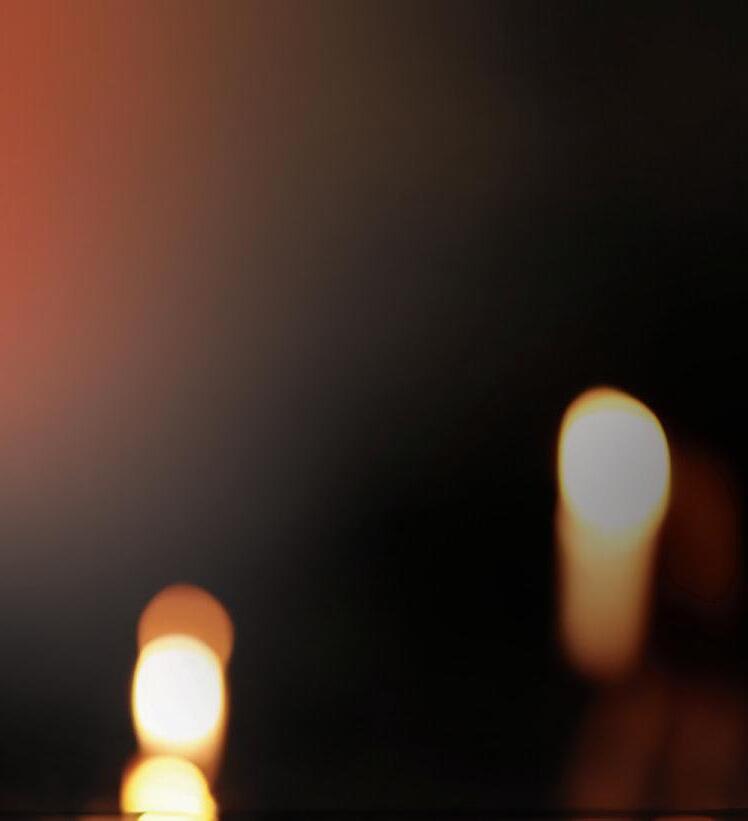





























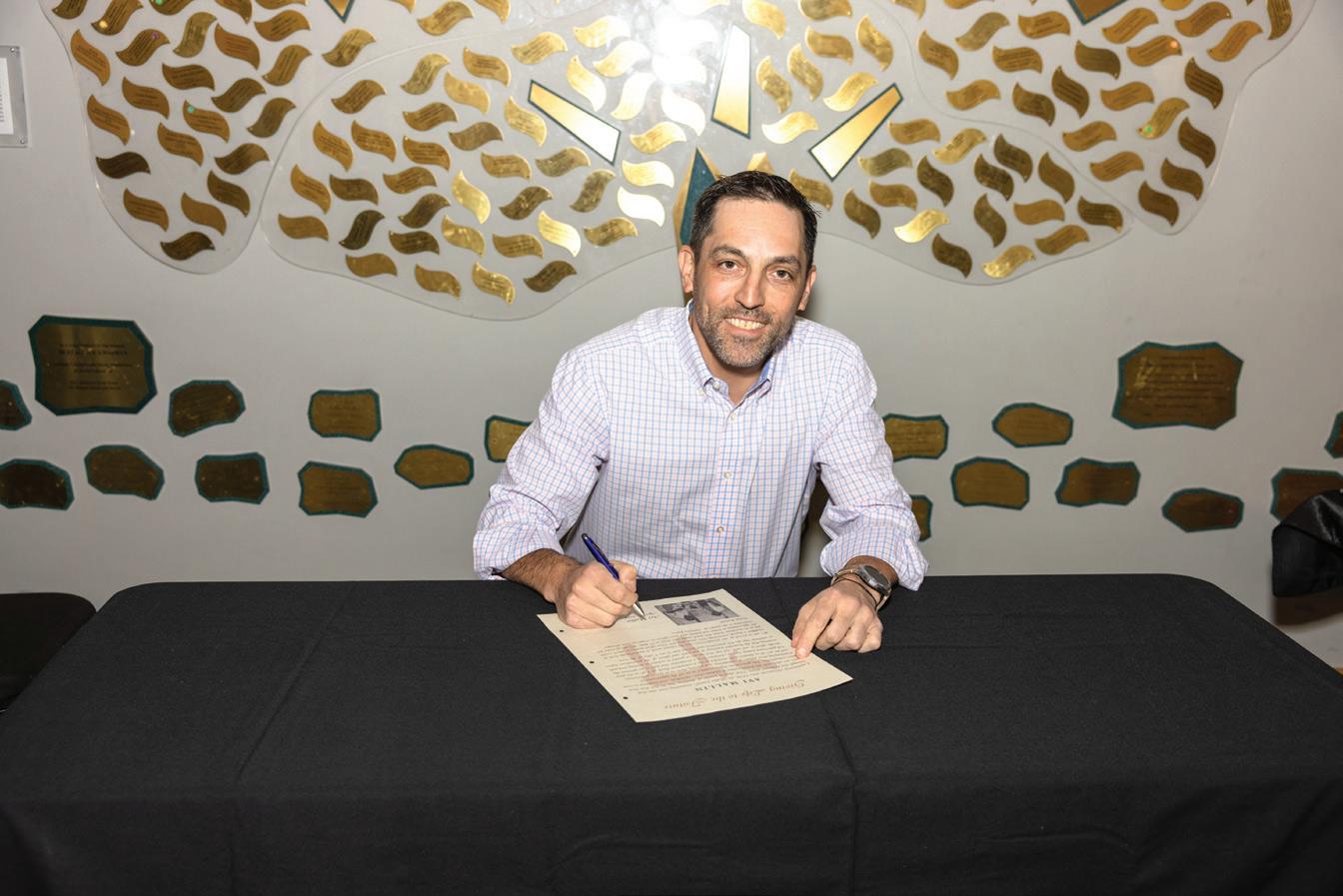










to our Life & Legacy Community Partners for securing over 1,100 legacy commitments with an estimated future value of $71.3 million!
Arizona Jewish Historical Society
Beth El Phoenix
Beth Joseph Congregation
Bureau of Jewish Education
Center for Jewish Philanthropy
Congregation Or Tzion
East Valley JCC
Gesher Disability Resources

Jewish Community of Sedona and the Verde Valley Synagogue
Jewish Family & Children’s Service
Jewish Free Loan
Minkoff Center for Jewish Genetics
National Council of Jewish Women
Arizona


Temple Chai
Temple Emanuel of Tempe
Temple Kol Ami
Valley Beit Midrash
Valley of the Sun JCC
Yeshiva High School of Arizona
‘Hope is not just a word, it’s a commitment’ for
AMY A. DUBITSKY | CONTRIBUTING WRITER
W
hen you drive up to an event venue for a formal gala, having an ambulance parked by the entrance would normally be a concerning site. Not on March 2, at Chateau Luxe Event Venue in Phoenix. On that evening, a Magen David Adom (MDA) ambulance was parked on the red carpet to greet the guests arriving for the Second Annual Hope Gala as a tangible vision of what their support has, and can do, to help MDA and the people of Israel.
After registration, guests who had purchased VIP access tickets were led to a private room for a cocktail reception where they were able to hear from some of the dignitaries. After the general registration, all the guests were gathered in the center hall. The lights were dimmed and as each guest held a candle, Elana Michael, director of Major Gifts of the Southwest Region of American Friends of Magen David Adom (AFMDA) started the night by saying that, “Hope is not just a word, it’s a commitment. Our light is still shining and together, we can make it shine brighter. Yachad — together we save lives. Am Yisrael Chai.”
Inside the main reception hall, the room was aglow with red lights as the guests were treated to a stirring rendition of Shir Hamaalot, a chapter of Psalms; Hatikvah, the national anthem of the State of Israel; and the national anthem of the United States. The mood lightened once the master of ceremonies and entertainer for the evening, comedian Elon Gold, took the stage. The crowd roared with laughter as Gold did his spot-on impression of President Donald J. Trump talking about how much he has helped Israel, “You know Eilat? Before me, it was Eilittle! The Dead Sea? I killed it!” After his routine,

Gold welcomed the special guests in the room, including Ambassador Gilad Erdan, former Israeli Ambassador to the United Nations and global president of Magen David Adom, Representative Alma Hernandez, Maricopa County Sheriff Jerry Sheridan, MDA Chief of Staff Uri Shacham, CEO of AFMDA
Catherine Reed and Lt. Colonel Jonathan Conricus, former Israel Defense Forces (IDF) spokesperson and senior fellow at Foundation for Defense of Democracies. Erdan was presented with an award in recognition of his work combatting antisemitism and his support of MDA. He then spoke about the Bibas family, Jewish unity and how “the UN was founded on noble ideas but now, it’s a dangerous weapon to delegitimize Israel.”
The next award went to Adham Safadi, an MDA emergency medical technician, for his service while carrying the burden of the loss of his daughter. Safadi, who responded when a missile landed on a



soccer field and recognized that his own daughter was among those children killed, suppressed his own emotion and continued to assist other injured children that needed medical attention.
The night continued with a live auction for one piece of artwork as well as an appeal with real-time pledges being made across the ballroom.
Conricus, well recognized for his television news appearances on behalf of the IDF after the Oct. 7 massacre, gave the final address of the evening. “Israel is fighting a war of existence against evil … but Israel is blessed with the most important resource — our people.” He also spoke about getting Hamas out of power and strategies for bringing the remaining hostages home.
Attendee Carole Shnier explained why it was important for her to be at the Hope Gala, “I have been a supporter of MDA for over 30 years. My parents instilled in me a love of Israel and a commitment to

support MDA and the lifesaving efforts of each paramedic and volunteer. That is what drives me to work to support them.”
Sheridan said, “It was an honor to be invited to support my Jewish friends and what is a great cause, the work they do to support the ambulance core in Israel — and they need the help — and it’s phenomenal.”
Rodney Glassman, attorney and candidate for Attorney General, commented on the mix of people in the crowd that evening, “When the Phoenix Jewish Community can bring together the Maricopa County Sherrif, with business leaders like the Efunes and the Hiltons to champion Israelis that are risking their lives every day, it’s a testament to those of us in the Valley and the Jewish State of Israel.” JN
For more information, visit afmda.org.
Amy A. Dubitsky is a freelance writer who has lived in Phoenix for over 20 years and plays an active role in the Jewish community.














































SHANNON LEVITT | STAFF WRITER
Robin Meyerson, leader of local Jewish organizations The Shabbat Project and Project Inspire Arizona, recently announced that she’s a candidate for the World Zionist Congress. Meyerson will join dozens of others to be part of the Aish Ha’am slate. Aish is a Jewish advocacy organization whose goal is to spread traditional Jewish religious teachings and culture around the world.
“In times of unprecedented challenges facing the Jewish people, silence is not an option,” Meyerson wrote in a press release outlining her decision to run.
“Today, the surge in antisemitism across North America demands not just our attention, but our active participation in shaping our community’s future,” she wrote.
The World Zionist Congress is a unique legislative body that lets Jews from all over the world have a say in Israeli affairs.
Founded by Theodore Herzl 128 years ago, the Congress has influenced Israeli policy on immigration, land use and religious affairs through its control of institutions such as the Jewish Agency and the Jewish National Fund. It also distributes about $1 billion a year to Jewish causes.
The election, which runs from March
10 to May 4, is seen as a referendum on the future of the country. So far, election administrators have touted record turnout during the first weeks of voting.
Jews in the United States can choose among 21 lists of candidates, or slates, each with a specific agenda and profile. Options are also available by denomination, demographics and outlook on Israel.
Aish Ha’am’s platform focuses on proIsrael advocacy, fostering Jewish unity and promoting “timeless Jewish wisdom.”
The list of candidates includes Shabbos Kestenbaum, a Harvard grad who sued his alma mater for its handling of antisemitism on campus and went on to endorse Donald Trump; and Lizzy Savetsky, a prominent right-wing pro-Israel social media influencer who spoke at Congregation Beth Tefillah in Scottsdale two years ago.
The other slates are Achdut Israel, AID Coalition (America-Israel Democracy), American Forum for Israel, Am Yisrael Chai, ANU: A New Union, Beyachad, Dorshei Torah V’Tzion, Eretz Hakodesh, Hatikvah: The Progressive Slate, Herut North America, Israel365 Action, Israeli American Council, The Jewish Future,

Kol Israel, Mercaz USA, Orthodox Israel Coalition – Mizrachi, Shas Olami, Vision, Vote Reform and ZOA Coalition.
For nearly all of Zionist history, there was no Haredi slate. In Israel and the United States, Haredi rabbis have historically regarded Zionism as a secular movement that clashes with traditional notions of God’s role in restoring Jews to the Land of Israel. They’ve allowed participation in Israeli democracy for the protection of their religious rights and state services, but viewed support for the World Zionist Congress as a capitulation to secularism.
However, a rebel faction emerged ahead of the 2020 election with the creation of a slate called Eretz Hakodesh, meaning “the holy land.” Championing “classical Jewish values of Torah,” the slate shocked the Zionist world by placing third out of 15 slates with about 20,000 votes. It turned out that many voters were willing to swallow the bitter pill of voting in their fight for Haredi interests. It is once again presenting a slate of candidates.
Meyerson said Aish Ha’am meshes best with her own Jewish work.
“I’ve witnessed how grassroots activism
and community engagement can transform lives. Through Peaceful Return, I’ve helped countless families choose traditional burial over cremation, sharing afterlife miracle stories that have touched tens of thousands globally. This work has taught me the profound importance of preserving our traditions while adapting to meet contemporary challenges,” she said.
Meyerson said her slate has four pillars, including fighting antisemitism, creating Jewish unity, providing Jewish education and protecting the Jewish people as a whole.
“These aren’t just campaign promises – they’re existential necessities for our community’s survival and flourishing,” she said.
Meyerson implored her fellow Jews to vote in this year’s election to show their commitment to participate in a Jewish future and to have their voice heard rather than be “passive observers of history.” JN
To cast a vote, visit azm.org/elections.
This article incorporated reporting from Jewish Telegraphic Agency.













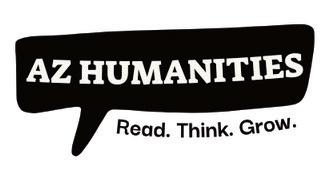























Valley Beit Midrash wishes everyone a shana tovah, a happy new year filled with joy and love. We invite you to join us in pursuit of improving lives in our communities through transformative learning and action. Here’s how you can plug into our work this year:





1. Learn with us at our upcoming classes. We have multiple pluralistic o erings each week and options for both virtual or in-person learning.
2. Serve with us and volunteer with Arizona Jews for Justice to help uplift the most vulnerable members of our community.


3. Reach out if you are looking for internship or fellowship opportunities for teens and young adults. We would be thrilled to tell you more about our leadership development programs.
4. Become a Legacy donor. By joining the Jewish Education Legacy Society of Valley Beit Midrash you will ensure VBM has the ability to provide engaging learning opportunities and save lives in our communities for many years to come.











We hope this year will be a time of renewal and growth and that we will experience many joyful moments together in the year ahead.
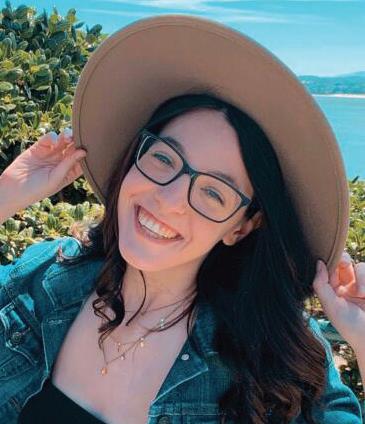

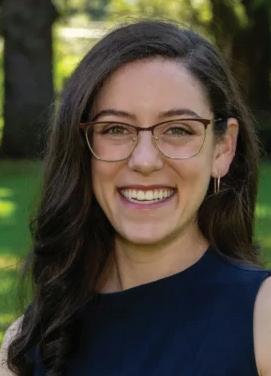












MALA BLOMQUIST | MANAGING EDITOR
On March 12, 1990, activists abandoned their wheelchairs at the foot of the U.S. Capitol to crawl up its steps and demonstrate the need for the Americans with Disabilities Act (ADA). At the time, the steps were the only means of access to the legislative branch of the U.S. government.
“I was born at 30 weeks and diagnosed with cerebral palsy in January of 1990, three months before the life-altering Capitol Crawl and only six months prior to the Americans with Disabilities Act, right before that was signed into law,” “Coach” Steph Roach, cancer survivor, personal trainer, author and owner of Staying Driven, LLC, told those gathered for the Gesher Disability Resources Community Luncheon and Agency Update on Feb. 19.
The ADA was signed into law by President George H.W. Bush on July 26, 1990, and prohibits discrimination against individuals with disabilities in




various areas of public life, including employment, education, transportation and access to public accommodations.
However, the ADA and related protections, like Section 504 of the Rehabilitation Act (a national law that protects qualified individuals from discrimination based on their disability), are facing legal challenges and potential erosion, with lawsuits and policy changes threatening the rights and accessibility of people with disabilities.
“I have never once lived a day of my life without knowing its (ADA) protections,” said Roach.
She asked the audience to close their eyes and imagine what it was like for participants of the Capitol Crawl: “to put yourself through physical distress and pain to prove that you and people who look like you or move like you were worth putting effort into.”
She said that despite 35 years of the ADA, society as a whole needs to do better because people with disabilities
Pan-American Elementary Charter School has a full time Middle School Science Teacher (Team Lead) position in Phoenix, AZ. Duties include: Dsgn & deliv science lessons to mid schl students; Monitor stdnt perf; Adjust strategy to improv contnt mastry; Creat, scheduling, adminstr, grade exams per AZ Standard & currclm; Cmmnct w parnts, teachrs, counslrs, & admin; Attnd training, PLCs, staff mtngs; Prvid guidnce & fdbck re science dept & schl ops; Mentor teachers. Req Bachelor’s or foreign equiv Edu, Bio, Chem, Physics, Biochem, Microbio, Geo, or relat edu or scienc field + 1 yr exp & AZ Teach Cert. Email res to todd. wade@panamericancharter.org. Incl code LP0601.
are still often seen as an afterthought or less important.
“Do you know how many times a week I won’t go into a public restaurant, the door weighing what feels like 100 pounds, and someone helping me grabs the door and says, ‘You think they should have a power door or something?’ Too many times to count,” said Roach.
She also said that she often parks in an accessible parking space and a shopping cart has been left in the access aisle where she should be able to deploy the ramp to her van but cannot.
“Leaving that cart in the access aisle might save someone a minute of their time, but as a result, I have lost a point of access and independence, leaving me to find a new parking spot or waiting for somebody to physically move the cart,” she said.
“Heavy doors and lackadaisical shoppers are a reality that we have to tolerate because our society would rather focus their energy on taking protections away rather than enhancing them,” she added.
She admitted for most of the formative years of her life, she never wanted to outwardly associate with the disability community. She was always asked to tone down things that made her different, like it was bad.
Roach was told to control her problems, stand up straight, only use the wheelchair when it was really necessary, not in the house, and it should never inconvenience anyone. “As a result, I hated myself and any connections that I had to the community for way longer than I cared to admit,” she said.
She said it took her a long time to understand that “normal is relative” and that using devices like crutches and a wheelchair elevates her independence, not hinders it. She’s learned that it’s

more than okay to change somebody’s life perspective by authentically being who you are.
“It is not lost on me that I’m sitting here in front of you speaking from a place of great privilege, as someone who has had access to an incredible education, special services to gain greater independence and access to equipment that ensures the quality of my life for the rest of my life,” said Roach.
Her five-year-old business, Staying Driven, caters to the specific needs of the adaptive and aging population. Its online, interactive experience is available to the public regardless of age, location, abilities or skill level.
As the world’s first certified CrossFit trainer with cerebral palsy, Roach also taught a Summer Bootcamp class at the Valley of the Sun Jewish Community Center in Scottsdale.
“I want to be an example of a woman entrepreneur living with a physical disability, doing the best she can to show the world that the people of her community bring immense value to this society,” she said.
Roach shared a quote from Judith Ellen “Judy” Heumann, an American disability rights activist, known as the “Mother of the Disability Rights Movement,” to emphasize her point: “Disability only becomes a tragedy (for me) when society fails to provide things we need to lead our lives.”
“The Capitol Crawl set the tone; it was a moment in history that sparked change,” said Roach. “If we collectively don’t feed that fire, it will inevitably burn out.” JN
For more information on Staying Driven, visit stayingdrivenlive.com; for Gesher Disability Resources, visit gesherdr.org.
SHANNON LEVITT | STAFF WRITER
On the first weekend of March, several Temple Chai teens took a quick trip to Washington, D.C., to learn about political advocacy. They then used those lessons to talk to their representatives in person on Capitol Hill.
Temple Chai Cantor Ross Wolman accompanied the confirmation class students to the Religious Action Center (RAC) of Reform Judaism’s L’Taken social justice seminar. Upon returning, he boasted on Facebook that the teens “spoke beautifully, affecting change in our democracy.”
The students met with staffers from the offices of Senators Mark Kelly and Reuben Gallego, as well as Representatives David Schweikert and Abraham Hamadeh.
The RAC has offered L’Taken weekends throughout the years, giving thousands of Jewish teenagers an opportunity to learn about their government up close and practice engaging with it. Participants take the opportunity to learn about a range of pressing political issues and best practices when it comes to convincing legislators to act, and it’s all woven between Shabbat celebrations and services.
Kayla Ullman, a sophomore at Pinnacle High School, appreciated the fact that the weekend was all “go, go, go” from almost the moment they arrived, especially as their plane had a delayed arrival and they had to skip the meal and go straight to services.
“I am not really a sit-down-and-listen type of person. I like to do things,” she told Jewish News.
True, the weekend included some sitting time, with kids learning about the issues that most interested them. But immediately following that, the kids got to work doing things, including making simulated advocacy calls. Their chaperones played the part of the senators and representatives while the teens rehearsed the talking points they developed in a less stressful setting before their Monday morning meetings on the Hill.
The Temple Chai teens broke into three groups, each tackling one of three issues: antisemitism, mental health or reproductive rights.
Ullman chose to talk to the congressional staffers about antisemitism because it’s something she has personally experienced.
Last year, she remembered that one morning she was scrolling through social media and saw pictures of swastikas drawn on the wall of one of her classrooms. By the time she got to that class, seven hours later, the swastikas were still there. She decided to wash them off and as she was working, someone walked by and muttered, “Of course, the Jew is cleaning it off.”
She remembers how much that comment stung.
“It really opened my eyes, just the fact that it happened,” she said.
She wrote down the painful memory to share with staffers.
“Those hateful symbols sat on that wall for seven hours before I got there. Seven hours where nobody else did anything. It was a moment that really opened my eyes to the

reality of antisemitism and the indifference that often accompanies it.”
Mia Kirshenbaum, a sophomore at Horizon High School and Ullman’s best friend, was also part of the antisemitism group.
When she got the chance to talk to the congressional aides, she spoke about the importance of Jewish values, such as caring, community and compassion. She shared Rabbi Lord Jonathan Sacks’ famous quote about antisemitism being about those who need someone to blame for their own values rather than being specifically about Jews themselves.
“The RAC does a great job of teaching kids how to lobby, how to write their speeches, what the challenges are and how to take action,” she told Jewish News.
Still, her favorite part was talking to Schweikert’s staffer. He was friendly and told the students about what it was like to work in professional politics. He made a personal connection, one that Kirshenbaum will remember. Making politics personal is something RAC hopes teens take away from the weekend.
Sheryl Kirshenbaum, Mia’s mom, chaperoned the trip along with Wolman.
“The RAC does an amazing job of teach-
ing the students about the topics and putting scenarios together to help them see what it all looks like, showing them that citizens do have a voice,” she told Jewish News.
As a former history teacher and current social studies curriculum specialist in the Paradise Valley Unified School District, Kirshenbaum was grateful for the opportunity to accompany her daughter and the other students and “experience through their eyes what our government is all about.” She also had the chance to throw in “little historical tidbits here and there.”
One highlight for everyone was touring the United States Holocaust Memorial Museum. In a town filled with American history, spending time at a museum focused on a gut-wrenching piece of Jewish history was important, they agreed. It was one of the few times on the trip that everyone was quiet.
Though the weekend was a bit of a blur filled with memorable moments — exploring Georgetown, Havdalah at the Thomas Jefferson Memorial, walking the halls of Congress — it made an impact, they all said.
“Seeing this through their eyes while they experienced democracy and why it’s important for Jews to be involved with politics was really special,” Kirshenbaum said. JN

ASAF ELIA-SHALEV | JTA
Mass layoffs and a sweeping restructuring at the Department of Health and Human Services could disrupt programs that deliver support for Holocaust survivors and kosher meals to homebound seniors and people with disabilities.
As part of the Trump administration’s move to slash federal spending, the department is reducing its workforce by 25% and eliminating the Administration for Community Living (ACL), which coordinates federal support for services such as Meals on Wheels, adult day care, elder abuse prevention and independent living supports.
Jewish social services agencies throughout the country deliver kosher offerings to peoples’ homes as part of the Meal on Wheels program. Holocaust survivors also receive other assistance from the ACL through a special program administered by the Jewish Federations of North America (JFNA).
An estimated 40,000 Holocaust survivors live in the United States today, and more than one third of them are living in poverty. JFNA, which has been fielding calls
and emails about the federal cuts from concerned Jewish organizations, says it is advocating with the government to protect services.
“ACL serves a critical role in supporting the independence of people with disabilities and older adults, including Holocaust survivors, and Jewish Federations are focused on ensuring that the vital programs it oversees will continue uninterrupted through any potential administrative changes,” David Goldfarb, senior director at JFNA’s strategic health center, said in a statement.
Established in 2015, the Holocaust Survivor Assistance Program aims to make welfare service providers more effective by training them in a health care approach known as person-centered, trauma-informed care. The program has received strong bipartisan support in Congress, which most recently allocated $8.3 million for it, while cutting many other earmarks, in the budget resolution approved last month.
In announcing the move, the department said that the reorganization would not affect

“critical services.” It said essential programs housed under ACL will become the responsibility of other agencies in the department including the Administration for Children and Families, Assistant Secretary for Planning and Evaluation, and the Centers for Medicare and Medicaid Services.
The cuts at the Department of Health and Human Services come as a spending
freeze at another federal agency puts security grants for synagogues and Jewish nonprofits in limbo. Jewish groups and a group of lawmakers from both parties are calling on the Trump administration to resume the Nonprofit Security Grant Program that stalled as part of the freeze ordered at FEMA, the federal disaster relief agency. JN
Donate any amount up to $938 for couples filing jointly ($470 for individuals) by 4/15/2025

via check, credit card or on-line at www.kivelcare.org
Submit tax forms, which will be sent to you upon request,* with your 2024 Arizona
on-line www.kivelcare.org or complete and FAX to: (602) 957-9493, mail to: Kivel Campus of Care: Tax Credit, 3040 N. 36th St., Phoenix, AZ 85018 or Call (602) 314-4002 Please send

LEVITICUS 6:1 - 8:36
Passover teaches us profound lessons about liberation, justice and empathy, with the Seder serving as the central ritual for introspection. One of its most poignant traditions, removing a drop of wine for each of the Ten Plagues, reflects Judaism’s ethical emphasis on compassion for all, even our enemies. And yet, as humans, we experience relief and sometimes joy in the defeat of those who actively wish to harm us. How do we reconcile these emotions with the Torah’s call for ethical sensitivity?
SHABBAT CANDLE LIGHTING
APRIL 11 - 6:38 P.M.
APRIL 18 - 6:43 P.M. PASSOVER
APRIL 12 - 7:35 P.M.
The Exodus story reveals the depths of human struggle and divine justice. As Pharaoh hardened his heart, refusing to free the Israelites, God unleashed the plagues, culminating in the deaths of the Egyptian firstborns. When the Israelites crossed the Red Sea and witnessed their oppressors’ destruction, they sang jubilantly. Moses offered the famous “Song of the Sea” and Miriam led the women in song and dance, rejoicing in their newfound freedom. The natural human response to liberation from oppression is joy — especially when the
OPINION
JEWISH CLERGY
Aoppressors are vanquished. However, Jewish tradition tempers such joy with compassion. The Midrash teaches that when the angels began singing at the drowning of the Egyptians, God rebuked them: “My creatures are drowning in the sea, and you want to sing?” This illustrates a divine perspective that values all life — even the lives of those who perpetrate evil. Similarly, at the Seder, we diminish our cups of wine to acknowledge the suffering endured by the Egyptians during the plagues. These acts of compassion remind us that triumph, while necessary, comes with ethical complexity. This balance is especially relevant when considering modern struggles, such as terrorism and the existential threats against Israel. We have seen Israel neutralize those who planned and executed the atrocities of Oct. 7, 2023. Thousands of Islamofascists have been eliminated in air strikes, the use of “special” beepers decimated the leadership of Hezbollah and many Hamas operatives were eliminated by conventional urban warfare. On our own shores, we have seen that the current administration has started to deport non-citizens engaged in support for Hamas who have also expressed their animus towards Israel, the United States and Western Civilization. Should we be rejoicing in the downfall of our foes? Or should we lament
their suffering, even if they brought it upon themselves?
APRIL 13 - 7:36 P.M.
APRIL 20 - 7:42 P.M. ENDS RABBI ARTHUR LAVINSKY PARSHAH TZAV:
The contrast between Moses and Miriam who broke out in song after the Egyptians who drowned in the Red Sea, and the angels who were chastised by God, is most telling. Perhaps this points to the fact that human beings and celestial beings are judged by different metrics. I submit that while “in heaven” it was considered improper to rejoice at the downfall of Israel’s foes, that here on earth it is quite acceptable and reasonable for people who are attacked to celebrate when their enemies are eliminated.
One of the central passages of the Haggadah reminds us “In every generation there arise those who rise to destroy us. And the Holy One, blessed be He, rescues us from their hands.” The threat to destroy the Jewish people persists to this day, and I firmly believe that those who wish the world to be Judenrein (free of Jews) don’t deserve our compassion. When a bombmaker or Jihadist Imam in Gaza (or Hezbollah controlled Lebanon) is targeted and killed, it is natural for Jews to celebrate. The same principle applies when non-American citizens who are here by the good graces of our government choose to disrupt classes at universities throughout our country, attack Jews, call for the dismantling of Israel and undermine the
APRIL 14 - 7:37 P.M. ENDS
APRIL 18 - 6:43 P.M.
APRIL 19 - 7:41 P.M.
Find area congregations at JewishAZ.com, where you can also find our 2025 Community Directory.
democratic values of the United States. We should not lament their deportation, let alone champion their cause.
What would God have to say about this? That’s hard to say, but I submit that God would probably understand the very human response to the downfall of evil which is wholehearted celebration. Maybe if the angels were to do the same in the heavens, God might frown upon their jubilation. They are, after all, divine creatures. But just like Moses and Miriam who broke into song after the Egyptians drowned in pursuit of the Israelites, I think that if we were to delight in the defeat of those who wish to destroy us, God would, in his infinite grace, give us a pass!
Shabbat Shalom and Happy Passover. JN
Rabbi Arthur Lavinsky is a retired pulpit rabbi and U.S. Navy chaplain and past president of the Board of Rabbis of Greater Phoenix.
t a time of fear and uncertainty over the domestic direction of the nation, a growing number of clergy around the country are speaking up about the importance of articulating and incorporating religious beliefs in shaping the current national dialogue. What began in February as privately expressed concerns within the confines of a group of Washington, D.C., area rabbis who meet weekly, the effort is now growing as more than 500 individual rabbis and cantors from across the country have signed a statement outlining a core set of beliefs, grounded in biblical and rabbinic texts, that they believe are missing in the current domestic political situation.
Arizona rabbis who have signed the statement include Rabbi Maynard W. Bell of Paradise Valley; Rabbi Charles S. Levi of Scottsdale; Rabbi Robert L. Kravitz of Scottsdale; Rabbi Jonathan Biatch, interim rabbi at Temple Emanuel of Tempe; Rabbi John A. Linder and Rabbi Debbie Stiel of Temple Solel in Paradise Valley; and Rabbi Norman T. Roman of Beth Shalom Temple
Center in Green Valley.
“Many of us have felt deep anguish over the past few months,” said Rabbi Fred N. Reiner, one of the founders of the original group. “As we prepare for Passover, our holiday celebrating freedom, we are reminded of its messages: empathy for strangers, caring for those seeking freedom, creating communities of compassion. Today, in the administration’s policies that are unfolding, we feel an absence of so many central religious beliefs that we teach and espouse. We hope that other religious leaders will also come forward with the beliefs and values that their denominations and communities hold and teach.”
In this time of swirling events and governmental chaos, it is important to remind ourselves of our core beliefs as American Jews. These are some of the values we hold dear, and which guide our lives and our actions.
1. We believe that all people are the children of God, endowed with holiness, all
Philanthropy, Jewish Federation of Greater Phoenix, Cleveland Jewish
should be a maximum of 200 words. They may be edited for space and
Unsigned letters will
equal in value. (Gen. 1:27)
2. We believe in welcoming the stranger, the alien in our midst, the one who lives with us. (Lev. 19:33) We are commanded to love the stranger as ourselves. We are a people of repeated migrations, descended from strangers in Egypt.
3. We believe in honesty, commanded not to bear false witness (Ex. 20:13, Lev. 19:11)
4. We believe in listening respectfully, valuing the ideas of those who disagree, and seeking peace. (Avot 1:12, 1:18)
5. We believe in fairness in business and all transactions: not engaging in fraud, paying workers promptly, honestly representing what is offered. (Lev.19:13; 19:35-6)
6. We believe in respect for others, especially for the strangers among us, for elders and those less fortunate, and all who struggle. We are commanded not to take advantage of the weakness of others, not to place a stumbling block before the blind. (Lev. 19:32; 19:14) We feel it is
important to engage in acts of kindness and believe that we are in relationship with all people and should behave with compassion and empathy. (Avot 1:2)
7. We call what we give to others tzedakah, giving based on justice. We believe in the importance of compassion, but what we give to others in need is based on seeking justice in society.
8. We believe in knowledge and the exchange of ideas, including minority viewpoints. We value learning and the advancement of knowledge, in science, in literature, sacred and secular. (Avot 1:16)
9. We believe in respecting and caring for our world, for tending the land and acting as dedicated stewards. (Gen 1:29-30 and Lev. 19:23 ff.)
10. We cherish the religious freedom in the United States and celebrate the diversity of beliefs and practices in our country. We deeply value the American Constitutional guarantees separating religion and state that have made possible the flourishing of all religions in our country. JN
CAITLIN SIEVERS | AZ MIRROR
Republican Superintendent of Public Instruction Tom Horne knows that a crisis is coming if Arizona teachers keep leaving public schools.
He thinks the best way to solve the shortage is to raise teacher pay — a solution that lawmakers on both sides of the aisle can get behind — and to strong-arm districts into implementing more forceful punishments to curb student misbehavior.
Horne’s latter idea, however, is not one that has garnered bipartisan support.
During his annual State of Education speech to the House Education Committee on Wednesday, March 12, Horne, who is also a member of Temple Solel in Paradise Valley, presented a list of wins from his past year in office and reminded lawmakers that teacher recruitment and retention was still a major issue in Arizona schools.
Horne shared that out of 60,000 public school teachers in the state, 8,000 are quitting each year and educator prepa-
ration programs, along with teachers returning to the field, are only replacing them at a rate of 4,700 annually. That means a loss of around 3,300 teachers every year.
This trend leads to long-term substitute teachers leading classes for which they aren’t properly trained. Horne highlighted the particular importance of having skilled educators on hand to teach young children to read.
“If we do nothing to reverse this trend, this could be a major catastrophe for our students and economy,” Horne said, adding that he’s heard complaints that students who graduate from Arizona high schools are not career or college ready.
He added that, in a poll conducted by the Department of Education, 67% of Arizona teachers who left the profession last year did so because of low pay. But 61% said that a lack of support in dealing with student behavior and discipline was also a contributing factor.
That is why Horne said he is backing a plan by the legislature’s Republican leadership to increase teacher pay by 10%.
Arizona ranks 32nd in the nation for teacher pay, according to the National Education Association, with an average salary of $56,775 that is nearly $10,000 less than the national average. The median household income in Arizona is about $74,500, according to U.S. Census data.
While Democrats also support pay increases for teachers, they have criticized the GOP’s plan for leaving out support staff.
But with a looming state budget deficit, Horne said this wasn’t the time for the state to fund increases to support staff, though he said he hopes schools can find the money themselves by becoming more efficient.
As of last year, Arizona was next-to-last among the states when it comes to perpupil school spending.
In an effort to give teachers more support with student discipline, Horne said he proposed Senate Bill 1459 to its sponsor in the Senate, Republican John Kavanagh, of Fountain Hills. The bill already made its way through that chamber by a party-line vote of 16-13 on Feb. 26.
It would require all public school districts to include a rubric for student discipline in their handbooks, not to dole out or fail to dole out punishments based on things like race, ethnicity or ancestry, and to report discipline information to the Department of Education annually. Districts would be required to report the total number of disciplinary referrals made by teachers each year and how many of those referrals resulted in the administration pursuing the disciplinary action recommended by the teacher. They would also have to report how many resulted in no disciplinary action.
SEE CRACKDOWN, PAGE 17


Camp Chanen is a fun-filled day camp for children ages 6 weeks to entering kindergarten. Our campers enjoy a variety of exciting activities, including special guests, weekly themed events, P.E., and water play - all designed to spark creativity and support the development of young minds.
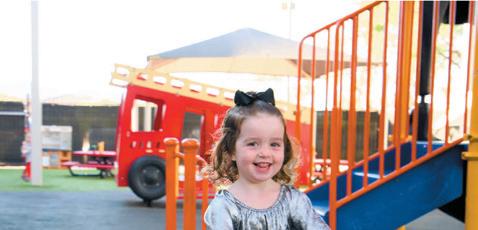




www.chanenpreschoolaz.org For more information: (480)-951-3398 chanenadmin@cbiaz.org





Camp 56 is a day camp for students entering 1st through 6th grade. Located on the same campus as Camp Chanen, we offer age-appropriate activities, exciting offsite field trips, and visits from special guests, all designed to engage and inspire campers throughout the summer.
(480)-951-0323 rvanlandingham@cbiaz.org


Camp Daisy and Harry Stein is a Jewish overnight camp in Prescott, AZ, for children entering 2nd - 12th grade Campers build lasting friendships, deepen their connection to Judaism, and enjoy a variety of fun activities, making it the ultimate summer experience. ...DANCE, SHABBAT, HORSEBACK RIDING, AND MORE! www.campstein.org (480)-951-0323 camp@cbiaz.org











PHYLLIS BRAUN | ARIZONA JEWISH POST
Proponents say Jewish overnight camps strengthen kids’ Jewish identity
This was certainly true for Tucsonan Nanci Ogur Levy, who spent four summers at Pine Forest Camp in Greeley, Pennsylvania, as a camper, plus a summer as a waitress and another as a counselorin-training.
“It actually was my first real experience celebrating Shabbat,” says Levy, who grew up on Long Island in a nominally Reform family that “didn’t do very much,” Jewishly speaking.
At camp, “I learned ‘Adon Olam’ and all the fun Shabbat songs. I didn’t have that before,” she says.
For the past nine years, Levy has been the community outreach coordinator at Handmaker, where she works with staff and volunteers to bring Jewish programming to residents, including Shabbat and other Jewish holiday celebrations and intergenerational programming with Tucson Hebrew Academy students and BBYO teens.
A Jewish couple, Hughie and Selma Black, started the camp in 1931. Still run by the Black family, Pine Forest doesn’t

Inclusive, warm, and vibrant.
market itself as a Jewish camp but continues the traditions of Friday night Shabbat services and reciting the Motzi blessing before meals.
When she went to Pine Forest in the late ’70s and early ’80s, Levy says, 95% or more of the campers were Jewish. She sometimes connects with camp friends on Facebook.
“It was a long time ago and I live far away,” she says. “I think about them.”
Along with the friendships and “the feeling of connectedness” camp gave her, Levy loved playing sports.
Pine Forest “was a very sporty camp and I was a pretty sporty kid. It was a very active camp, very busy,” she says. Her favorites included gymnastics and volleyball.
“I loved summer camp – time of your life,” says another Pine Forest alum in Tucson, Brett Averick.
Averick spent eight summers as a Pine Forest camper and two as a counselor and a waiter, overlapping with Levy, who remembers him as “one of the older, cool kids.”
Starting at age 8, Averick was in a bunk with mostly the same boys year after year.
“It kind of shapes your life,” he says.
“Some of my best friends are people I grew up with at summer camp.”
Camp gave him a unique opportunity to develop his athletic skills. He explains that he played on the camp tennis team but was too small to have played competitively in college.
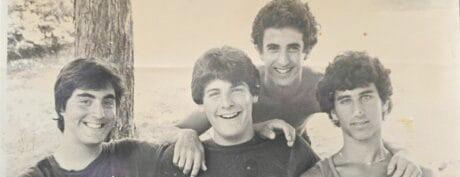

Shabbat services at Pine Forest weren’t particularly meaningful for him, but camp “made my social sphere, the people that I hung out with and loved, Jewish.”
“And I love the bar mitzvahs and the weddings and all that kind of stuff,” he says.
Since most of Averick’s camp friends lived nearby in New Jersey, they would take the train to visit each other during the school year. Learning to drive made visiting easier, but once they started college the reunions became less frequent.
The guys still maintain a text group, though. “We talk all the time,” he says.
unprepared for the power of being among hundreds of Jewish campers.
“Coming from Tucson, being in this community with so many Jewish kids was eye-opening,” she says.
She enjoyed “the whole Shabbat experience, the singing, it was just really so magical,” she says, while Ramah’s casual use of Hebrew for everything from announcements to bunk names reinforced her Jewish learning.




Liturgical-Hebrew Program
Tikkun-Olam Projects
Hands-On, Interactive Learning
Professional, Certified Teachers
Small Class Sizes
Pre-K through Seventh Grade
Playing tennis and other sports including softball and basketball against other camps taught kids conflict resolution and sportsmanship, Averick says.
Conflict resolution also came into play, he says, when it came to girls.
“There’s only a finite number of girls … and you have to navigate that if two guys in the same bunk like the same girl.”
Averick, who grew up in the Philadelphia suburb of Abington, describes himself as “sort of an agnostic, secular kind of guy.”
For Tucson native Sarah Artzi, attending Camp Ramah in Ojai, California, was “just the most immersive Jewish experience that I ever had, to this day.”
Artzi was one of many Tucsonans who went to the Ojai camp in the ‘70s and ‘80s, encouraged by the late Rabbi Arthur Oleisky of Congregation Anshei Israel, an alum of Camp Ramah in Wisconsin. Ramah is affiliated with the Conservative movement.
Artzi recalls flying to California with 40 or so Ramah-bound Tucsonans. Yet she was
Artzi loved Ramah so much she returned as a staff member in 2022 when the camp needed a parent liaison or yoetzet. She explains that each age group has a liaison to work with campers, staff, and parents, “should the need arise.”
“It was a great opportunity to go back and capture a little bit of that feeling,” she says.
Artzi’s son David went with a large group of Tucson boys to Camp Timberlane in Wisconsin, then owned by Tucsonans. Her younger son, Michael, spent a couple of summers as a Ramah camper and returned as a lifeguard.
But her daughter, Adina, is a Ramah “lifer,” she says, with “easily 12 years” as a camper and staff member.


First day of Hebrew School
Sunday, August 17 | 9:00 am
Enrollment breakfast and backpack drive mitzvah project!
1118 West Glendale Avenue Phoenix, Arizona (602) 944-3359
$10 OFF any training package!
$10 OFF any full service groom!
Special Membership Bene ts:
• Extended hours Mon-Sun 5am - 9pm
• First week FREE with any weekly daycare membership enrollment!
• $10/night OFF Boarding @dogtopiapvvillage • 480-605-3044 dogtopia.com/phoenix-paradisevalleyvillage

Adina, who recently became engaged, met her fiancé at camp. So many campers meet their future spouses at Ojai that the camp created a bridge or gesher l’chuppah where couples can get a plaque commemorating their marriage date.
Artzi gets a kick out of the multigenerational connection.
“Some of Adina’s best friends from camp have the exact same last names as my best friends from camp, because they’re their kids. There’s this incredible dor l’dor,” she says, using a Hebrew expression for “generation to generation.” JN
Phyllis Braun is the feature writer for Arizona Jewish Post. This piece originally appeared on AZJewishPost.com.
If the district does not implement disciplinary action for at least 75% of teacher referrals without a “reasonable justification,” the school would be notified that it did not adequately punish misbehaving students and could be subject to a reduction of their school letter grade the next year if they don’t make changes. If the district doesn’t hand out the adequate percentage of punishments in the next year, the Arizona Department of Education could reduce the school’s letter grade.
Each year, the Department of Education is required to give letter grades from A-F to each public school in the state, based on student academic performance.
Rep. Judy Schwiebert, a Phoenix Democrat and former teacher, said she’d consulted with multiple school leaders within her district about the bill and said that they were alarmed that the Legislature and Department of Education would interject themselves into the complicated matter of discipline that they believe is best dealt with at the local level.
“I think we all agree that behavior is a problem for teachers,” she said. “We need to find a way to provide support for teachers.”
She added that solutions should happen
through collaboration among teachers, administrators, students and parents.
“I would challenge you to come up with a collaborative instead of a punitive approach,” she said.
Horne countered that “permissive school boards” — he singled out Phoenix Union High School District’s board — allow students to curse at teachers and tell teachers to use social emotional learning to deal with it. Horne’s bill would ban the use of any discipline that involves social emotional learning and restorative justice.
“There are outrageous things happening in our schools and we’re suffering,” Horne said.
He added that Arizona’s academic scores are poor because of it, and the future of the state’s economy is in jeopardy.
“”Oh, you poor darling, it’s not your fault,’” Horne said, mimicking a district leader that uses social emotional learning to deal with negative behaviors. “‘You come from a poor background so you’re misbehaving because of society.’ When they take that approach, you have anarchy in your classrooms. Kids do not learn and teachers leave the profession.”
Democratic Rep. Laura Terech, of Scottsdale, asked Horne how lowering a school’s letter grade would help support teachers. Horne answered that it would

put political pressure on the members of the school board to enforce harsher punishments to get classrooms under control and make teaching easier.
Rep. Nancy Gutierrez, D-Tucson and a high school teacher, said she was worried that the term “disciplinary action” was not defined in the bill. If a student in her classroom is being disrespectful, Gutierrez said she typically has a private conversation with that student, which usually resolves the issue.
She wondered if that would count as disciplinary action or if the bill would incentivize teachers and administrators to give harsher punishments than were actually necessary.
“I’m getting complaints from teachers who aren’t being supported,” Horne said. “They came into the profession to teach, not to be policemen.”
Gutierrez countered that there are many reasons a student might come to school and have a behavioral outburst, and that to deal with it, school staff need to get to the root of the problem. Having well-trained teachers who have experience in dealing with behavioral issues was a better solution than Horne’s proposal, she said.
Rep. Jennifer Pawlik, D-Chandler, added that some of the concerns of administrators in her district include
that a teacher might refer a student for discipline without knowing all sides of the story, and it’s the administrator’s job to ensure they hear all sides and give the student due process. This bill could essentially punish administrators for deciding not to punish a student after obtaining more information about an incident and deciding that the teacher’s recommendation was unfair.
Pawlik said that the Department of Education and Legislature should work to better equip teachers to deal with students who have behavioral issues instead of punishing them. Solutions could include hiring more aides, decreasing class size and supplying experienced mentors to newer teachers.
There are 62 people and organizations officially registered in favor of the bill, while 385 are signed in against it, including the Arizona Association of County School Superintendents, the Arizona Charter Schools Association, the Arizona School Boards Association and Arizona School Administrators. JN
Caitlin Sievers joined the Arizona Mirror in 2022 with almost 10 years of experience as a reporter and editor, holding local government leaders accountable from newsrooms across the West and Midwest. This piece originally appeared on AZMirror.com.

ANDREW LAPIN | JTA
The letter grades that the AntiDefamation League has issued to campuses on their response to antisemitism are showing signs of growing influence: The group announced today that several schools have adopted new policies to improve their grades in the month since this year’s report was released.
The ADL also said it upped grades for 19 of the 135 schools it assessed this year, including Northwestern University, Johns Hopkins University, Stanford University and the University of Southern California. Eleven of those schools implemented new policies in the last month, while the other eight made the Jewish anti-bigotry group aware of existing policies that had not factored into the initial grades.
In a statement, ADL CEO Jonathan Greenblatt called the revised grades “encouraging,” adding, “These important
steps and policies send a clear message that antisemitism will not be tolerated on campus.”
The ADL’s report cards, now in their second year, remain controversial among Jews on campus for using rubrics that critics argue fail to take the totality of Jewish student life into account and unfairly penalize schools when antisemitic incidents take place, rather than focusing on how the campus responds to them.
At the same time, many schools are paying close attention to them: the ADL says that 84% of all the colleges it graded “engaged” with the group on their grades.
The new policies some schools adopted to boost their grades include:
Forming new committees and advisory councils on antisemitism and Jewish life (Purdue University, University of Georgia and the University of South Florida,

among others)
Implementing bans on masked protests (Tulane University)
Launching Jewish alumni groups (Tulane, University of Pittsburgh, University of California Santa Barbara)
Incorporating antisemitism into antidiscrimination training and policies (American University and San Diego State University, among others)
The ADL bumped nearly all of the revised reports up by one letter grade, with the exception of the University of Minnesota, which jumped from an “F” to a “C.” In the process the revised scores lifted three “F” grades (at Minnesota, UC Santa Barbara and Cal Poly San Luis Obispo) and awarded three new “A” grades (at Purdue, Georgia and Arizona State University).
None of the ADL’s revised grades take into account the latest development on
campus: pro-Palestinian student protesters being arrested by immigration officials and threatened with deportation. Hillel International’s CEO released a statement this week expressing concern over the deportation effort.
The ADL did not respond to a request as to whether such headline-grabbing incidents, which have unfolded at Columbia and Tufts Universities as well as other schools, would factor into their report card grades.
The group had praised the arrest of Palestinian protester Mahmoud Khalil at Columbia, while calling for the law to be heeded. This week, in an interview with Jewish Insider, Greenblatt called out “this disturbing pattern of how these enforcement actions are happening.” JN
For more information, visit adl.org/ campus-antisemitism-report-card.

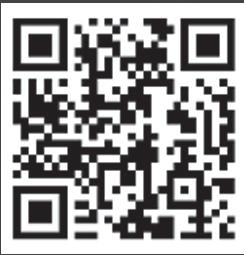
DEBRA RUBIN | JTA
Enid Cherenson’s family has been buying seafood from Wulf’s Fish for 40 years.
Originally an iconic fish store in the Jewish district of Brookline, Massachusetts, Wulf’s Fish transitioned about a decade ago to become a wholesaler. Now it sells both to local restaurants and caterers and ships from its warehouse in the Boston seaport to devoted chefs and home cooks all over the country.
Cherenson, 73, still relies on Wulf’s for her pre-Passover purchases — especially the gefilte fish packages customized by Wulf family scion Richie Taylor, now 74. A traditionalist, Cherenson makes the dish from scratch — buying filets, bones and heads from Wulf’s to make her special recipe.
“We’ve been making my grandmother’s recipe my whole life,” Cherenson said. “I make it exactly the same way in exactly the same pot, and the pot only gets used for gefilte fish at Passover.”
There are many loyal customers like Cherenson who’ve stuck with the company
founded by Taylor’s great-uncle Sam Wulf in 1926. Wulf used to stock his store on Harvard Street in Brookline with fresh catch that he’d procure that morning walking the Boston Fish Pier before sunrise.
Many other customers come to Wulf’s because they’re looking for guidance on how to prepare gefilte fish the old-fashioned way. They may have a basic recipe inherited from their mother or grandmother but no idea what fish to use or how much.
That’s where Taylor’s expertise comes in.
Wulf’s customer service representatives can answer most questions about the fish, but Taylor is on call if needed.
“I’ll talk to anybody who has questions,” he said. “They’re surprised that I’m still here.”
To help them figure out the puzzle — gefilte is traditionally made from whitefish, carp or pike — Taylor asks customers about their taste preferences, what their grandmother’s gefilte fish looked like and where their families are from. Plain carp is darker

than other fish, while buffalo carp and whitefish are fattier. Russians, Europeans and Israelis typically would have used plain carp, whereas in New York the preference was for buffalo carp, or a mix of pike and whitefish.
Taylor can also tell what’s in a dish of already cooked gefilte just from taking a bite. Texture and taste are the tells. Whitefish has a fattier and softer texture than pike, according to Taylor, who prefers fattier fish. He likens the differences to making a burger using beef that’s 20% fat versus 3%: The texture is totally different.
“Richie comes and saves the day for everyone wanting to make gefilte fish,” says Alisha Lumea, Wulf’s vice president for marketing and brand strategy. “It seems like everyone is Richie’s favorite customer.”
Taylor, who worked summers in his uncle’s store when he was a kid, didn’t plan


for a career in the family business. After high school he set off for the University of Vermont, where he majored in business. Then, in 1975, the newly minted graduate got a call from his Uncle Sam asking him to help out in the store.
The plan was to be there for a few weeks.
“It was a very busy retail store,” Taylor recalled. “I waited on customers, helped buy the fish. Back then, you did everything. Fortunately for me, I learned everything.” He calls this time in his life “fish college.”
At the time, the retail shop was among many fish stores in the Boston area. Rather than patronize supermarkets, most people shopped at mom-and-pop stores: the bakery for baked goods, the butcher for meat, the fruit store for produce and the fish store for seafood.
Wulf’s was among the few stores that SEE GEFILTE, PAGE 20



CONTINUED FROM PAGE 19
stocked the typical freshwater fish needed for gefilte throughout the year. Back then gefilte fish was a weekly staple, especially among Boston’s large Jewish immigrant community from Eastern Europe, including many Holocaust survivors.
The older customers knew what type of fish they wanted, and about 40% of them ground it themselves, according to Taylor. Some customers had very specific preferences, wanting only Lake Michigan whitefish or “the buffalo carp with the small head,” Taylor said.
Demand peaked before holidays like Rosh Hashanah and Passover, when Wulf’s found itself inundated. If Passover came early and the lakes were frozen, you couldn’t get pike or whitefish, Taylor said. In some cases, customers would buy alternatives but ask Taylor to put pike on the sales slip so their mothers or wives wouldn’t catch on.
Wulf’s wasn’t just a store; it was a gathering place for Boston’s Jewish community. Customers waiting for their orders would kibbitz and share recipes.
Four years after the retail store closed in 2016, Wulf’s began selling fish online. Today the company offers everything from everyday favorites like salmon and red snapper to specialty items like lobster tails
and caviar.
Although Wulf’s sells shellfish and other non-kosher items, they’re handled separately from the other fish at Wulf’s facility, which is certified as kosher by the Rabbinical Council of New England.
For those looking to prepare gefilte fish, Wulf offers ground gefilte fish provisions sold in one-pound, frozen-and-vacuum sealed packages of lake whitefish, walleye pike, buffalo carp or common carp. Taylor is on call for questions if needed.
Some customers order from Wulf’s Fish not just with a thought to their stomach, but their hearts — in short, tradition.
One repeat customer Taylor cited buys a single fish head with his pre-Passover gefilte fish order to memorialize his mother, who used to order a fish head for reasons he never learned.
“He and his sister, who makes the fish, do it to remind them of their mother,” Taylor said.
In an age of instant food and jarred gefilte fish, Wulf’s Fish is dedicated to helping customers drawn to the old ways.
“I hope more people will feel empowered to make gefilte fish at home,” Lumea said. “Otherwise, the tradition could die out.” JN
Home cooks or chefs can visit Wulf’s Fish website (wulsfish.com) for Gertie Wulf’s gefilte fish recipe, or to place orders for a variety of other fish.
LORI
HOCH STIEFEL | PJ LIBRARY’S PASSOVER HUB
While many families have their go-to holiday favorites (tradition, tradition!), keeping meals fresh — especially for little ones — can be a challenge. With this easy, delicious recipe, you can cook together, make memories and keep Passover meals exciting.
Ingredients
• 3 cups matzah farfel, or broken up pieces of matzah
• 1 cup walnuts (or any nuts that you like)
• ½ cup pecans (or any nuts that you like)
• 3 tablespoons sugar (any type, white works well)
• ½ teaspoon sea salt
• ½ tablespoon cinnamon (you can add in other warming spices like ginger and nutmeg)
• 1 tablespoon flax seed
• ¼ cup coconut oil
• 1/3 cup + 1 tablespoon agave syrup (maple or honey work well too)
• 1 teaspoon vanilla extract
• 1 medium ripe banana, mashed (½ cup)
Directions
Preheat the oven to 350°F.
In a large mixing bowl, combine the matzah, cinnamon, sugar, salt, flaxseed and nuts. Stir well to evenly distribute the ingredients.
In a small saucepan over medium-low heat, warm the coconut oil, maple syrup (or agave/honey) and vanilla extract. Stir occasionally until fully melted and combined. Remove the saucepan from heat and whisk in the banana puree until smooth and well blended.
Pour the warm liquid mixture over the dry ingredients in the bowl. Stir thoroughly to ensure everything is evenly coated. Evenly spread the mixture onto one or two baking sheets, making sure it’s not overcrowded to allow for even crisping. Place in the oven and bake for 23-28 minutes, or until golden brown. Keep an eye on it, as the coconut oil helps it crisp up but can cause it to brown quickly. JN
Recipe by Lori Hoch Stiefel with inspiration from The Minimalist Baker’s “Simple Grain Free Granola.”
This recipe originally appeared on PJ Library’s Passover Hub. For more information and recipes, visit pjlibrary.org/passover.
VERED GUTTMAN | THE NOSHER
Passover kashrut laws are always challenging, and the biggest challenge has to be finding a good kosher-for-Passover cake. If you need the cake to be pareve (dairy free), that’s even harder.
So when a festive and good-looking Passover cake, made of layers of chocolate cake and whipped cream, first appeared in a national newspaper in Israel in the 1980s, it was immediately adopted by many home cooks, my mother included.
The cake was a revelation! At the bottom rests a rich chocolate layer made of whipped eggs and melted chocolate. When cooled down, the cake is topped with simple whipped cream lightly mixed with a drizzle of melted chocolate. The cake was not only kosher for Passover, but could easily be made pareve (using nondairy whipped cream), which is always a bonus.
For my family, the cake became synonymous with Passover, sort of an oldfashioned treat that everyone waits for the whole year.
Then, in recent years, I started noticing versions of it pop up in every Israeli food blog and column, only this time around the cake got a fancy name — it was now called a Krembo Cake!
Krembo, in case you’re unfamiliar, is a treat that’s popular in Israel during the winter. It consists of a plain cookie that’s topped with a soft marshmallow cream that’s dipped in chocolate. The treat originated in Denmark in the 19th century and versions of it are available throughout Europe.
Israelis love Krembo, and giving a new name to a favorite old cake did the trick. The cake (with a facelift) is in again, and everyone gets to enjoy it.
Ingredients
For the chocolate cake:
• 5 large eggs, at room temperature
• 6 tablespoons sugar
• ¼ teaspoon kosher salt
• 6 ounces (170 grams) bittersweet chocolate, chopped (can be parve or vegan chocolate)
For the cream topping:
• 3 ½ cups heavy cream, very cold (or parve whipping cream substitute, see notes)
• 2.8 ounces (80 grams, 8 tablespoons) instant vanilla pudding powder (kosher for passover)
• Grated zest of one lemon
For the chocolate ganache:
• 4 oz (115 g) bittersweet chocolate, chopped (can be pareve or vegan chocolate)
• ¼ cup heavy cream (or pareve whipping cream substitute, see notes)
• 2 tablespoons butter (or pareve/vegan butter substitute)
Directions:
Preheat oven to 300°F. Grease a 9-inch round springform pan.
Put eggs in the bowl of a stand mixer and whip for 1 minute on medium speed. With mixer running, slowly add the sugar in a steady stream, then add the salt. Increase the speed to high and whip for 8 minutes until the eggs quadruple their volume.
In the meantime melt the chocolate on bain-marie or in 20-second intervals in the microwave, mixing between intervals. When eggs have quadrupled in volume, reduce speed to medium and slowly pour the melted chocolate in. Increase the speed of the mixer again and mix until chocolate is combined. The mixture will lose some of its volume.
Pour mixture into prepared pan and bake for 20-22 minutes, until cake feels soft but not runny in the center. Transfer to a cooling rack.
After 10 minutes, use a knife to release the cake from the sides of the pan (do not open the pan, keep the cake inside). Put a clear cake strip around the cake to make for a cleaner presentation (optional) and transfer the cake to the fridge for 30 minutes.
Put the cold heavy cream in the bowl of a stand mixer. With mixer running on low, slowly add the vanilla pudding powder to the cream. Stop the mixer to scrape the powder from the sides of the bowl as needed. Turn mixer speed to high and mix for a couple of minutes or until the mixture creates soft



peaks. (Make sure not to over whip, the mixture should still be soft. It will get firmer in the fridge over time.) Remove bowl from mixer, add lemon zest and fold it in. Use a spatula to transfer the cream to the cake pan on top of the chocolate cake and smooth the top. Transfer to the fridge for 1 hour.
To make the ganache, put all the ingredients in a bain-marie or in a microwave safe bowl and melt in 20 seconds intervals, mixing between intervals.
Take the cake out of the fridge and slowly pour the chocolate ganache all over the top. Use an icing spatula to spread the ganache evenly all over the top.
Cover the pan with aluminum foil and transfer to the fridge for at least 4 hours to set.
Notes:
This cake can be made pareve by using a pareve heavy cream substitute, such as Rich’s Richwhip, parve or vegan chocolate, and vegan butter. It’s one of the rare cases where these substitutes work well.
In order for the eggs to whip nicely they should be at room temperature.
Use a clear cake strip (or cake collar) for a more elegant presentation.
The cake keeps in the fridge for up to five days. Serve cold. JN


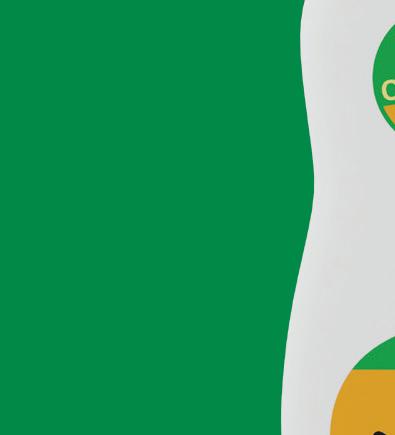












PENNY SCHWARTZ | JTA
An endless Passover seder takes center stage in “One Little Goat: A Passover Catastrophe,” by writer Dara Horn and illustrator Theo Ellsworth, award-winners who teamed up for a humor-filled, time-travel graphic novel for young people.
The tale of an epic seder — it drags on for six months — joins a new crop of children’s books with Passover themes, from a based-on-a-true-story retelling of a Pesach celebration on Mt. Everest to a look inside President Barack Obama’s White House seder, a first in American history.
This year, the eight-day holiday, also known as the Festival of Freedom, begins at sundown on Saturday, April 12.
“My Matzah”
Ann Diament Koffsky Apples & Honey Press; baby to 2
Young kids will be delighted to share a young koala’s excitement as the toddler searches its house for the afikomen — the piece of matzah that Papa Koala hid as part of the seder. The eager joey searches everywhere — and even turns upsidedown — but needs a little help from Papa to find the missing matzah.The colorful board book brims with Ann Diament Koffsky’s buoyant illustrations.
“Zayde Babysits before Passover”
Jane Sutton; illustrated by Kate Chappell Kar-Ben Publishing; ages 4-8
Ruthie is excited because her grandfather, whom she calls Zayde, is going to babysit all day, while her mother and Bubbe prepare for that


night’s Passover seder. This lively, brightly illustrated story is full of zany fun, ending with the family seder, when Ruthie proudly recites the Four Questions.
“Happy Passover, Edie Rose!”
Joy Preble; illustrated by Valeria Cis Kar-Ben Publishing; ages 4-9
Mia lives with her family in a big city apartment. Every year she looks forward to celebrating the Passover seder at the home of Edie Rose, a vivacious woman who invites her neighbors from all backgrounds for the festive ceremonial meal. When Edie Rose breaks her arm baking macaroons, Mia is determined to surprise her by
bringing the seder to her. All the neighbors pitch in with homemade Passover foods. The heartwarming, cross-generational, multicultural story highlights the seder’s theme of welcoming all.
“Passover on Everest”
Rachelle Burk; illustrated by Craig Orback Intergalactic Afikomen; ages 5-10
When Nikki Bart was a young girl on a family vacation in Israel, she and her mother hiked to the top of Masada, the ancient hilltop fortress overlooking the Dead Sea. A few years later, the mother-daughter team set out on a more challenging climb, to reach the summit of
Mount Everest. It is just before the start of Passover and along the way, Nikki tells their Tibetan Buddhist guides that she would miss being with her family for the holiday. In this beautifully illustrated story, inspired by the Barts’ actual hike, readers enjoy Nikki’s journey and the surprise seder that the Sherpas prepare for her and her multicultural climbing companions.
“Ellis Island Passover”
Marissa Moss
Creston Books; ages 5-10
After being sent to her room for misbehaving, a 7-year-old girl is not in the mood to celebrate Passover. But when















her favorite uncle walks in the door, he spirits away her sadness as he recounts his childhood immigrant story to America when he spent a very unusual week at Ellis Island. His inspiring story deepens the girl’s appreciation of Passover and she happily joins her family for their seder.
“Roadside Seder”
Anna Levine; illustrated by Naama Lahav Apples & Honey Press; ages 5-8
When a huge log falls across a major Israeli highway on the eve of Passover, the traffic jam threatens to upend the seder plans for scores of families. Despite the best efforts of a clever boy named Benji and other stranded travelers, the massive palm is immovable. Determined to have a seder, Benji transforms the log into a Passover table and asks others, including his Ethiopian-Israeli grandmother, to share the foods they have packed in their cars. Naama Lahav’s animated illustrations convey the seder’s spirit, as Benji realizes it takes a community to solve a problem.
“The Curious Case of the Missing Pot Roast: A Passover Mystery”
Jamie Kiffel-Alcheh; illustrated by Menahem Halberstadt Green Bean Books; ages 4-7
The Passover seder’s Four Questions are no match for an inquisitive boy who is always tossing out clever questions and riddles. In this lighthearted story, the high-energy sleuth is determined to find out why his mother trims off the ends of the pot roast she cooks for their seder. He dashes through their apartment building to his grandmother and greatgrandmother, who solves the mystery. At their seder, when he recites the Four Questions, he feels a deep connection with his multi-generational family who are gathered around the festive table.
“Next Year in the White House: Barack Obama’s First Presidential Seder”
Richard Michelson; illustrated by E.B. Lewis Crown Books; ages 4-8
In the spring of 2009, President Barack Obama became the first sitting president to attend a Passover seder at the White House, bringing together the AmericanJewish community and the country’s first Black president. In addition to First Lady Michelle Obama and their daughters, Malia and Sasha, other guests included a trio of Jewish White House staffers who threw together an impromptu seder the year before while campaigning with Obama. The award-winning team of Michelson — who’s Jewish — and Lewis, an African American, bring to life this fascinating story of how that seder inspired a president.

“One Little Goat: A Passover Catastrophe”
Dara Horn; illustrated by Theo Ellsworth Norton Books for Young Readers; ages 8 and up
In this wildly imagined, time-travel graphic novel, a family’s seder drags on for six long months, a plight recalled by the teenage son, the story’s protagonist. The weary family is stuck in time because the teen’s toddler sister tossed aside the
afikomen — the hidden piece of matzah that must be eaten before the seder can end. The action takes off when a talking goat appears at the door — a nod to “Chad Gadya,” the traditional song sung at the end of the seder. The wise-cracking goat escorts the teen on a journey to search for the afikomen, traveling back through layers of seders past, to the original biblical Exodus night. The teen returns to his family’s seder — afikomen
in hand — with renewed appreciation for the endurance of the Jewish people. Horn, the author of five novels for adults and the nonfiction essay collection “People Love Dead Jews,” is a threetime winner of the National Jewish Book Award. Ellsworth’s work has been included in the “Best American Comics” anthologies. JN









































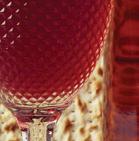

































































































































































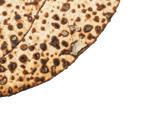



good for your heart
The Jewish Community Relations Council of Greater Phoenix hosted its annual Latino Jewish Seder last month to bring together the Jewish and Latino communities to share traditions, stories and meaningful conversations over a Passover Seder.
Watching the Super Bowl with Smile on Seniors. Seated from left are Michael and Elaine Kates, Janet Lottman and Leslie and Brad Levy.
Congregation Beth Tefillah’s Babyccino, a mommy and me group hosted by Dr. Abigail Gewirtz, during its recent weekly Tuesday meeting. Gewirtz is a child psychologist and spoke about mindful parenting.
Andrea Cohen, center, thanked the members of Salk AZA (a boy’s chapter of BBYO) for hosting a bake sale to benefit the Center for Jewish Philanthropy of Greater Phoenix Camp Scholarship Program. Their efforts will help CJP send hundreds of local campers to Jewish camps across North America.
Thirteen Hamilton High School Air Force JROTC students recently attended a Post 610 Jewish War Veterans’ meeting to learn about their time in the service. Each cadet paired up with a vet to hear their story so they could later be able to share it with fellow cadets.
Ellen Shulman Tuckman, right, and Helena Feldman Nathan celebrated the 69th anniversary of their b’nai mitzvah in February. Nathan traveled from New Orleans to join Tuckman at Congregation Beth Israel in Scottsdale, where they both took turns reading from their Torah portion.
OF
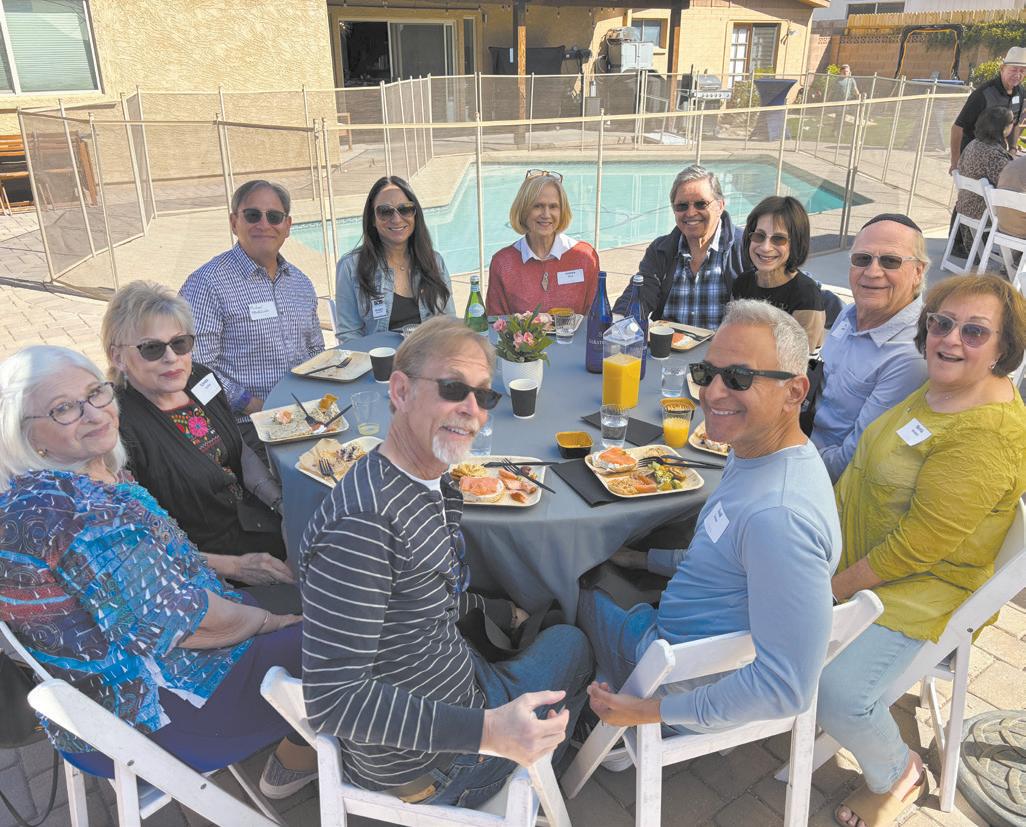
Smile on Seniors hosted its Jewish Active Mature Adults brunch social on Feb. 23. Pictured from left are Ana Spence, Linda Lober, Michael and Nancy Mendelsohn, Andrea Silvey, Peter and Irene Baron, Isy and Benita Sonabend, David Termine and Dave Shooten.
COURTESY OF SMILE ON SENIORS

On Sunday, March 23, Temple Solel hosted its annual Women’s Passover Seder. It was an evening of spirituality, song and shared tradition led by Solel Rabbi Debbie Stiel and including the vocals of Tamara Lieberman. This special Seder weaves together the rich tapestry of Jewish heritage with the voices and experiences of women.

Lilach Mazor Power, Jewish entrepreneur, owner of the Giving Tree Dispensary and founder of the pre-roll brand Sneakers, hosted a $10,000 giveaway in February. Here, she presents a giant check for $10,000 to military veteran, Matthew Sabo.
Every month, the women of Congregation Beth Tefillah’s Book Club delve into Jewish literature from around the world, reading fiction, non-fiction and everything in between — all through a Jewish lens.
OF
That’s a long time! Temple
Colton Rahav leads young families as they sing Shabbat songs at Congregation Beth Tefillah’s Mishpachti
Congregation Beth Tefillah’s youth directors, Rabbi Yisrael and Eden Kumer, led a leadership training for teens while hiking in Phoenix. The goal was to empower the teens to lead fun and engaging activities for younger kids.
On Tuesday, Feb. 25, Temple Kol Ami’s board of trustees unanimously voted to extend Cantor Noa Shaashua’s contract for five more years.
OF
This COMMUNITY page features photos of community members around the Valley and the world. Submit photos and details each week to editor@jewishaz.com by 10 a.m. Monday.
This COMMUNITY page features photos of community members around the Valley and the world. Submit photos and details each week to editor@jewishaz.com by 10 a.m. Monday.
SUNDAY, APRIL 27
2025 Yom HaShoah/Holocaust Remembrance Commemoration: 5 p.m. Symphony Hall, 75 N. Second St., Phoenix. Join the Phoenix Holocaust Association in partnership with The Phoenix Symphony for a community-wide event honoring the 80th anniversary of the end of WWII and liberation. Features a procession of local Holocaust survivors, a candlelighting ceremony, speaker Esther Basch, a 96-year-old Holocaust survivor, and local dignitaries including Gov. Katie Hobbs and Mayor Kate Gallego, The Symphony will perform during the event and also hold a special concert at 2 p.m. (tickets available at phoenixsymphony.org). Commemoration event is free, for more information or to RSVP, visit phxha.com/remember.
FRIDAY, APRIL 11
Rising Above Together: ADL Conference on Antisemitism: 8 a.m.-3 p.m. Omni Tempe Hotel at ASU, 7 E. University Drive, Tempe. Join the Anti-Defamation League, Arizona State University and other community partners for an event that brings together civic leaders, educators, law enforcement, students, interfaith partners and more to share ideas and work on real ways to fight antisemitism and hate. Cost: $36 per person; registration closes on April 8. For more information, visit jewishphoenix.com/events/ adl-summit-on-antisemitism-and-hate.
FRIDAY, APRIL 18
Passover: The Great Escape: 10:30 a.m.-12 p.m. Valley of the Sun Jewish Community Center, 12701 N. Scottsdale Road, Scottsdale. Join the VOSJCC, PJ Library and the Bureau of Jewish Education of Greater Phoenix for an interactive experience to teach kids (ages 5-10) about the story, rituals and themes of Passover. Cost: Free. For more information, visit bjephoenix.org.
Mishpachti Tot Shabbat: 4:30-5:30 p.m. Congregation Beth Tefillah, 6529 E. Shea Blvd., Scottsdale. Join CBT for a Shabbat sing-along, live music, Kiddush and blessings. Cost: Free. For more information, visit bethtefillahaz.org.
TUESDAY, APRIL 22
Jewish War Veterans: Volunteers in Action: East Valley Jewish Community Center, 908 N. Alma School Road, Chandler. Join the EVJCC for a presentation by Gabe Forsberg, veteran advocate. For more information, visit evjcc.org/ tuesdays.
The End of the Post-Holocaust Era: How Oct. 7 Changed Everything: 7-8:30 p.m. Online and in person at Congregation Or Tzion, 16415 N. 90th St., Scottsdale. Join Or Tzion and Valley Beit Midrash for the Zeichick Family Lecture featuring Yossi Klein Halevi, senior fellow at the Shalom Hartman Institute in Jerusalem. For more information, visit valleybeitmidrash.org.
WEDNESDAY, APRIL 23
Fore the Kids: 6:30 a.m.-12:30 p.m. TPC Scottsdale Champions Course, 8243 E. Bell Road, Scottsdale. Join the Valley of the Sun Jewish Community Center for a charity golf tournament in support of the SMILE Campaign that provides financial assistance for programs and education at the VOSJCC. For more information, visit valleyofthesunj.org/fore-the-kids.
THURSDAY, APRIL 24
Holocaust Remembrance Day: 3-4:30 p.m. Temple Beth Shalom of the West Valley, 12202 N. 101st Ave., Sun City. Join TBSWV for presentations by Nancy Urbach, whose grandfather rescued 200 relatives and friends from the Nazis, members whose parents were Holocaust
survivors and West Valley ministers and rabbis. Cost: Free; registration closes on April 23 at 12 p.m. For more information, visit tbsaz.org.
SUNDAY, APRIL 27
JWV Speakers: 9:30 a.m. Oakwood Country Club Recreation Center, 24218 S. Oakwood Blvd., Sun Lakes, Join Jewish War Veterans Copper State Post 619 for guest speakers Command Sergeant Major, U.S. Army (retired) Richard “Rick” Kreiberg, executive director of Veterans Affinity and Barb LeChaix and Mary Williams with the Ahwatukee Recreation Center Support the Troops. For more information, contact Arthur Uram at 702-884-4175 or uramarthur@gmail.com.
Works by Bach, Mozart, Kreisler and Jewish Melodies: 3 p.m. Jewish Community of Sedona and the Verde Valley, 100 Meadowlark Drive, Sedona. Join Red Rocks Music Festival for a performance by violinist Moshe Bukshpan and pianist Lali Breen. Cost: $25. For more information, visit redrocksmusicfestival.com.
“Frontline Warriors: The Fight Against Campus Antisemitism”: 7-8 p.m. Butterfly Wonderland, 9500 E. Via de Ventura, Scottsdale. Join Project Inspire Arizona for a film screening featuring the story of Aish Ha’am student candidates standing up to antisemitism a Columbia, Harvard and UCLA. One of the documentary’s stars, Shabbat Kestenbaum will be there preevent. For more information, visit jewishphoenix.com/events/film-frontline-warriors-againstcampus-antisemitism.
MONDAY, APRIL 28
Educators’ Film Screening of “October 8”: 6-8 p.m. Location provided upon registration. Join the Center for Jewish Philanthropy of Greater Phoenix for a screening of the documentary that explores the aftermath of Oct. 7. Appropriate for educators working with teens and adults. For more information, visit jewishphoenix.com/events/ educators-film-screening-of-october-8.
Fiscally Fit: To Buy or Not to Buy?: 7-8:30 p.m. Ina Levine Jewish Community Campus, 12701 N. Scottsdale Road, Scottsdale. Join Jewish Free Loan for a financial literacy event with real estate and mortgage experts. Cost: Free. For more information, contact outreach@jewishfreeloan.org.
TUESDAY, APRIL 29
“Mazel”: 6-8:30 p.m. Arizona Jewish Historical Society, 122 E. Culver St., Phoenix. Join the AZJHS, Theatre Artists Studio and Phoenix Holocaust Association for a staged reading and talk back of the play “Mazel” featuring the playwright Amy Hartman, the show’s cast and director Kathleen Butler. Cost: $36; refreshments will be served. For more information, visit phoenixhsa.formstack.com/forms/mazel.
WEDNESDAY, APRIL 30
Through the Lens: Insights from IDF Soldiers: 6:30-8 p.m. Locations provided upon registration. Join NowGen, a program of the Center for Jewish Philanthropy of Greater Phoenix, The Jewish Agency for Israel and the Israel Defense Forces for a presentation by Shlichim B’Madim (emissaries in uniform) as they share their personal stories of life in the IDF. For more information, visit jewishphoenix.com/events/ through-the-lens-insights-from-idf-soldiers.
THURSDAY, MAY 1
Israel at 77: 5-7:30 p.m. Valley of the Sun Jewish Community Center, 12701 N. Scottsdale Road, Scottsdale. Join the VOSJCC to celebrate Israel’s birthday with live music, a shuk, carnival rides, games, beer garden and food truck. Cost: Free; registration closes on April 30. For more information, visit valleyofthesunj.org/israel-77.
SUNDAYS
B.A.G.E.L.S: 9-11 a.m.; last Sunday of the month. Valley of the Sun Jewish Community Center, 12701 N. Scottsdale Road, Scottsdale. Grab a bagel and a cup of coffee at Bagels And Gabbing Every Last Sunday and enjoy some time with your friends and make new ones. You must register to attend. Bagels and coffee will be provided. Cost: Free for members, $5 for guests. For more information and to register, visit vosjcc.org.
THURSDAYS
Storytime at Modern Milk: 9:30 a.m. Modern Milk, 13802 N. Scottsdale Road, #163, Scottsdale. Storytime for babies, toddlers and preschoolers. Integrates children’s books and songs while giving parents new ideas for play. Cost: $5. For more information and to register, visit modernmilk.com/after-baby.
SUNDAYS
Chassidus Class: 9 a.m. Online. Learn about the Chasidic movement with Rabbi Yossi Friedman. Use this link: ChabadAZ.com/LiveClass. Cost: Free. For more information, visit chabadaz.com.
Jewish War Veterans Post 210: 10 a.m. Online. Any active duty service member or veteran is welcome to join monthly meetings, every third Sunday. Cost: Free. For more information, email Michael Chambers at c365michael@yahoo.com.
MONDAYS
Pomegranate Guild of Judaic Needlework, Desert Cactus Chapter: 10 a.m. The Oasis at Sagewood, 4555 E. Mayo Blvd., Phoenix. The guild meets the third Monday of the month, adjusted when necessary to accommodate Jewish holidays. For more information, visit pomegranateguild.org.
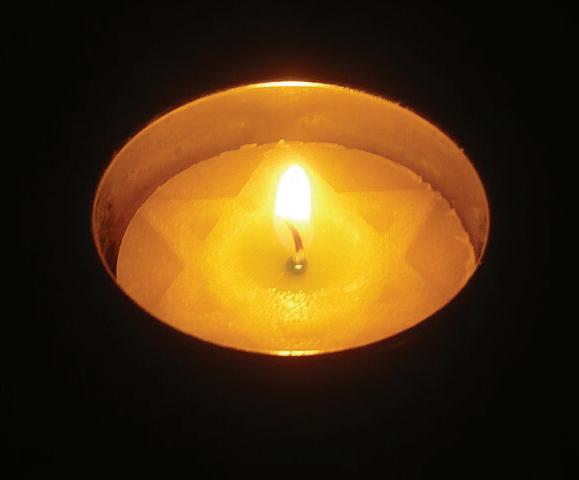
Mahjong: 1:30-3:30 p.m. East Valley Jewish Community Center, 908 N. Alma School Road, Chandler. Come play mahjong each week. For all levels. Cost: Free; registration required at evjcc.org/mahjong.
Quotable Quotes by our Sages: 7 p.m. Online. Learn with Rabbi Shlomy Levertov. Use this link: JewishParadiseValley.com/class. Cost: Free. For more information, visit chabadaz.com.
Single Parent Zoom: 8 p.m. First and third Monday of every month. Join The Bureau of Jewish Education’s Family University single parents’ group for those looking to form friendships and build their support system with likeminded people. For more information or to register, visit bjephoenix.org/family-university.
TUESDAYS
Let’s Knit: 1:30 p.m. Ina Levine Jewish Community Campus, 12701 N. Scottsdale Road, Scottsdale. Share the pleasure of knitting, crocheting, etc. outside the social hall in the campus. Can’t knit? They will teach you! Every level welcome. Cost: Free. For more information, visit vosjcc.org.
Torah Studies: 7:30 p.m. Online. Learn with Rabbi Mendy Levertov. Use this link: ourjewishcenter.com/virtual. Cost: Free. For more information, visit chabadaz.com.
WEDNESDAYS
Torah Study with Temple Beth Shalom of the West Valley: 11 a.m.-12:30 p.m. Online. Weekly study group explores that week’s portion and studies different perspectives and debates the merits of various arguments. Intended for adults, Torah study is open to students of all levels. For more information, contact the TBS office at 623-977-3240.
Happiness Hour: 11:30 a.m. Online. Class taught by Rabbi Pinchas Allouche that delves into texts and references culled from our traditions to address a relevant topic. For more information or to join, visit cbtvirtualworld.com.
Grief Support Group: 5-6 p.m. Online via Zoom. Therapist Susan Charney MCW, LCSW, leads a grief support group every first and third Wednesday of the month virtually for individuals experiencing the loss of an adult child or sibling. In lieu of any fees for these sessions, donations to Temple Solel are appreciated. For more information, contact susancharneycounseling@gmail.com.
JACS: 7:30-8:30 p.m. Online. Zoom support group for Jewish alcoholics, addicts and their friends and family on the first and third Wednesdays of the month. Cost: Free. For more information, email jacsarizona@gmail. com or call 602-692-1004.
THURSDAYS
Interfaith Course on Jewish Humor: 10-11:30 a.m. April 3, 10 and 17. Temple Shalom of the West Valley, 12202 N. 101st Ave., Sun City. Join TBSWV Rabbi Dana Evan Kaplan for this course analyzing jokes dealing with Jews and Judaism from different perspectives. Cost: $20 for members; $35 for nonmembers. Registration deadline is March 31. For more information, visit tbsaz.org.
Ladies Torah & Tea: 10:30 a.m. Online. Learn about the women of the Torah with Mrs. Leah Levertov. Use this link: ourjewishcenter.com/ virtual. Cost: Free. For more information, visit chabadaz.com.
Talmud - Maakos: 11 a.m. Online. Learn with Rabbi Shlomy Levertov. Cost: Free. Use this link: JewishParadiseValley.com/YJPclass. For more information, visit chabadaz.com.
The Science of Everything: 11 a.m. Online. Explore the most fundamental work of Chassidut: the Tanya, with Rabbi Boruch. Use this link: zoom.us/j/736434666. Cost: Free. For more information, visit chabadaz.com.
Mindfulness Gatherings: 12 p.m. Online. Hosted by Hospice of the Valley via Zoom. Cost: Free. To join by phone, dial 1-253-215-8782, meeting ID 486 920 2119#, to get the Zoom link or for further questions contact Gill Hamilton at ghamilton@hov.org or 602-748-3692.
Weekly Mahjong: 1-3 p.m. Temple Solel, 6805 E. McDonald Drive, Paradise Valley. Join Temple Solel each Thursday afternoon for mahjong. Lessons available for beginners. Cost: Free. RSVP via email to dottiebefore@gmail.com so they know how many tables to set up.
Teen Discussions: 7-8:30 p.m. Online. Learn with Rabbi Tzvi Rimler. Use this link: cteen.clickmeeting.com/east-valley. Cost: Free. For more information, visit chabadaz.com.
SATURDAYS
Saturday Mindfulness Gatherings: 9:30 a.m. Online. Hosted by Hospice of the Valley. To join by phone, dial 1-253-215-8782, meeting ID 486 920 2119#. To get the Zoom link or for more information, contact Gill Hamilton at ghamilton@hov.org or 602-748-3692.
Book Discussion: 1:30-2:30 p.m. Online. Join Or Adam Congregation for Humanistic Judaism on the third Saturday of every month for a book discussion. For more information and to register, contact oradaminfo@gmail.com.
Shabbat
FRIDAYS
Shabbat in the Park: 10-11 a.m. Cactus Park, 7202 E. Cactus Road, Scottsdale. Join the Bureau of Jewish Education of Greater Phoenix monthly for music, parachute play, crafts and a family Shabbat experience. For more information, visit bjephoenix.org.
Welcome Shabbat: 11-11:30 a.m. Online. Celebrate Shabbat with the JFCS Virtual Center for Senior Enrichment. Each week a different guest host will lead the program with song and celebration. Cost: Free. For more information, visit jfcsaz.org/cse.
Shabbat at Beth El: 5:45 p.m. on Zoom; 9:30 a.m. at Beth El Phoenix, 1118 W. Glendale. Ave., Phoenix or livestreaming at tinyurl.com/beclivestream. Celebrate Shabbat with songs, blessings and teachings with Rabbi Stein-Kokin and Cantor Sarah Bollt. For more information or to join, visit bethelphoenix.com.
Erev Shabbat Service: 5:30 p.m. Online. Rabbi Alicia Magal will lead a service livestreamed for members of the Jewish Community of Sedona and the Verde Valley. Cost: Free. For more information and to obtain the Zoom link, visit jcsvv.org/contact.
Shabbat Service: 5:30-6:30 p.m.; Oneg at 5 p.m. Temple B’rith Shalom, 2077 Brohner Way, Prescott. Join Temple B’rith Shalom for a musical and spiritual Shabbat service. For more information, visit brithshalom-az.org.
Shabbat Services: 5:30 p.m. nosh, 6:15 p.m. service; morning service has varying dates and times. Temple Chai, 4645 E. Marilyn Road, Phoenix. For more information, contact Joan Neer at jneer@templechai.com.
Pre-Shabbat Kiddush Club: 6 p.m. Online. Say Kiddush with Rabbi Mendy Levertov. Cost: Free. Use this link: ourjewishcenter.com/virtual. For more information, visit chabadaz.com.
Shabbat Services: 6 p.m; 9:30 a.m. Congregation Or Tzion, 16415 N. 90th St., Scottsdale. Services are also live streamed at otaz.org/ livestream. For more information about services, events and membership, visit congregationortzion.org or call 480-342-8858.
First Friday Shabbat Services: 6:15 p.m.; Oneg at 7:15 p.m. Valley Unitarian Universalist, 6400 W. Del Rio St., Chandler. Join Congregation NefeshSoul for Friday night services the first Friday of each month in the sanctuary building of Valley Unitarian Universalist. For more information, contact Jim Hoffman at 480-329-3316.
Shabbat Services: 6:15 p.m; 10 a.m. Congregation Beth Israel, 10460 N. 56th St., Scottsdale. Services held in the Goldsmith Sanctuary. Participants must pre-register by Thursday at 5 p.m. Priority will be given to members first and then guests. If there are more requests than available seats a lottery system will be used. For more information or to make a reservation, visit cbiaz.org/shabbat-services.
Kabbalat Shabbat and/or Shabbat morning service: 6:30 p.m.; 10 a.m.; dates vary. Congregation Kehillah, 5858 E. Dynamite Blvd., Cave Creek. Join Rabbi Bonnie Sharfman and cantorial soloists Erica Erman and Scott Leader either in person or via Zoom. For safety reasons, please register ahead of time. For dates, visit congregationkehillah.org/event/. Register by emailing info@congregationkehillah.org.
Shabbat Services: 7 p.m. Temple Beth Shalom of the West Valley, 12202 N. 101st Ave., Sun City. Services are followed by an Oneg. Services are live-streamed on YouTube. For more information and to get the YouTube link, visit tbsaz.org or call 623-977-3240.
Shabbat Services in Sun Lakes: 7-9 p.m. Sun Lakes Chapel, 9240 E. Sun Lakes Blvd. North, Sun Lakes. Sun Lakes Jewish Congregation conducts Reform Shabbat services on the second Friday of each month. New members welcome. For more information, call 480-612-4413 or 480-580-1592.
Shabbat Services with Beth Ami Temple: 7 p.m. Services held at Unitarian Universalist Congregation of Phoenix, 4027 E. Lincoln Dr., Paradise Valley. Join Beth Ami Temple Rabbi Alison Lawton and Cantorial Soloist Michael Robbins as they lead Shabbat services twice a month. For more information, visit bethamitemple.org.
Third Friday Shabbat: 7-9 p.m. Group meets at a North Scottsdale location. The Desert Foothills Jewish Community Association hosts a Shabbat service followed by a program. Contact 602-487-5718 for more information. JN

Charlotte Eila Rogers will become a bat mitzvah on May 3, 2025, at Temple Kol Ami. She is the daughter of Jen and Chris Rogers of Scottsdale.
Charlotte’s proud grandparents are Jan and Milton Kahn of Hillsdale, New Jersey, and Annette and Bob Rogers of Scottsdale.
For her mitzvah project, Charlotte organized a toy drive benefiting Phoenix Children’s Hospital with her Desert Canyon Middle School Student Government class.
A student at Desert Canyon Middle School, Charlotte is an accomplished club athlete and honors student and has a passion for learning, reading and playing volleyball. JN
William J. Adler
William J. Adler died peacefully in his sleep on Feb. 11, 2025. He worked for New York Life Insurance Company as his primary career. He moved to Arizona with his family in 1952, and always cherished all the state has to offer.
He was an avid sports fan, including a season ticket holder for the Phoenix Suns and the Arizona Diamondbacks. He loved to write and published a book chronicling the history of his family of origin, as well as articles in the Jewish News and Phoenix Gazette.
He is survived by his children Cindy and Susan (Stefan); his brother, Bobby; and his three grandchildren Jennie (Craig), Simon and Samson. His wife, Trudi, passed in August, 2024.
Joe E. Gross (March 10, 1940-March 2, 2025)
Joe Gross died on March 2, 2025, about a week before his 85th birthday. He is survived by a brother, a son, a sister-in-law, a brotherin-law, a daughter-in-law, three grandchildren, nieces, nephews, cousins and by the people he touched as a teacher, librarian, scout leader and coach. His baseball teams didn’t win many games, but every kid got to play whether he could catch or not. His scouts didn’t earn many merit badges, but we went camping every month. His library was well-stocked with birds, fish, turtles and machines in need of repair. There was even a buffalo head, obtained at a garage sale, hanging from the wall. Joe’s goal was to attract kids to the library, get them close to the books they might borrow or steal, rather than teach them the Dewey Decimal system. Card cataloguing was never Joe’s strong point.
Joe drove broken-down cars including a VW bus that had to be parked on hills so he could start it by popping the clutch on the way down. The old bus did not have air conditioning, but he drove it across country with the sliding door open to ventilate our four-person family, plus two dogs, all glued with sweat to the plastic seats. Joe didn’t care much for tradition. He did all the cooking while his wife, Carol, worked for the fire department. His religious practices were equally undogmatic. The best career move he ever made, he would tell you, was to retire in his mid-50s so he could devote himself to woodworking. His motto was measure once and cut twice, in reverse of the usual practice, and he applied the same loving imprecision to his craft that he practiced in life. The results were unorthodox. They were also numerous. Many lucky people own one of his pens, ornaments, toys or pieces of furniture, not to mention those missing library books. From time to time, they take out their Joe-Grossoriginals and gaze in wonder at what can happen when someone — my father —ignores rulers.
The Hon. Geoffrey A. Balon Judge, Mesa Municipal Court
Johnny Basha Investor
Rabbi Aviva Shira Funke
Associate Director
Bureau of Jewish Education of Greater Phoenix and Principal, Hebrew High
Andrew Gibbs Director NowGen
Jessielyn K. Hirschl
Associate Director of Donor Relations
ASU Foundation for a New American University
Andre Ivory
Education Director Congregation Or Tzion
Sarah Kader
Deputy Director, Desert Region Anti-Defamation League
Denise Kaye Owner/CEO
Connections In Homecare & Communities
Allison Kierman
Estate Planning Attorney Kierman Law, PLC
William M. Koslow
Managing Partner Koslow Law PLC
Adam Metzendorf
Director of Business Operations Phoenix Mercury
Jen Rogers Co-Founder
Hudson West PR
Ian Sachs President Risk Resource
Lindsey Schauer Seitchik
National Political Consultant SHQ, LLC
Jennifer Starrett
Director, Belonging and Antisemitism Initiatives Center for Jewish Philanthropy of Greater Phoenix
Dr. Joshua Steinberg Partner Dentist Jawman Dental
Rebecca Weinstein
Membership and Board Relations Manager American College of Medical Toxicology
Ethan Weiss Chief of Staff Stocktwits